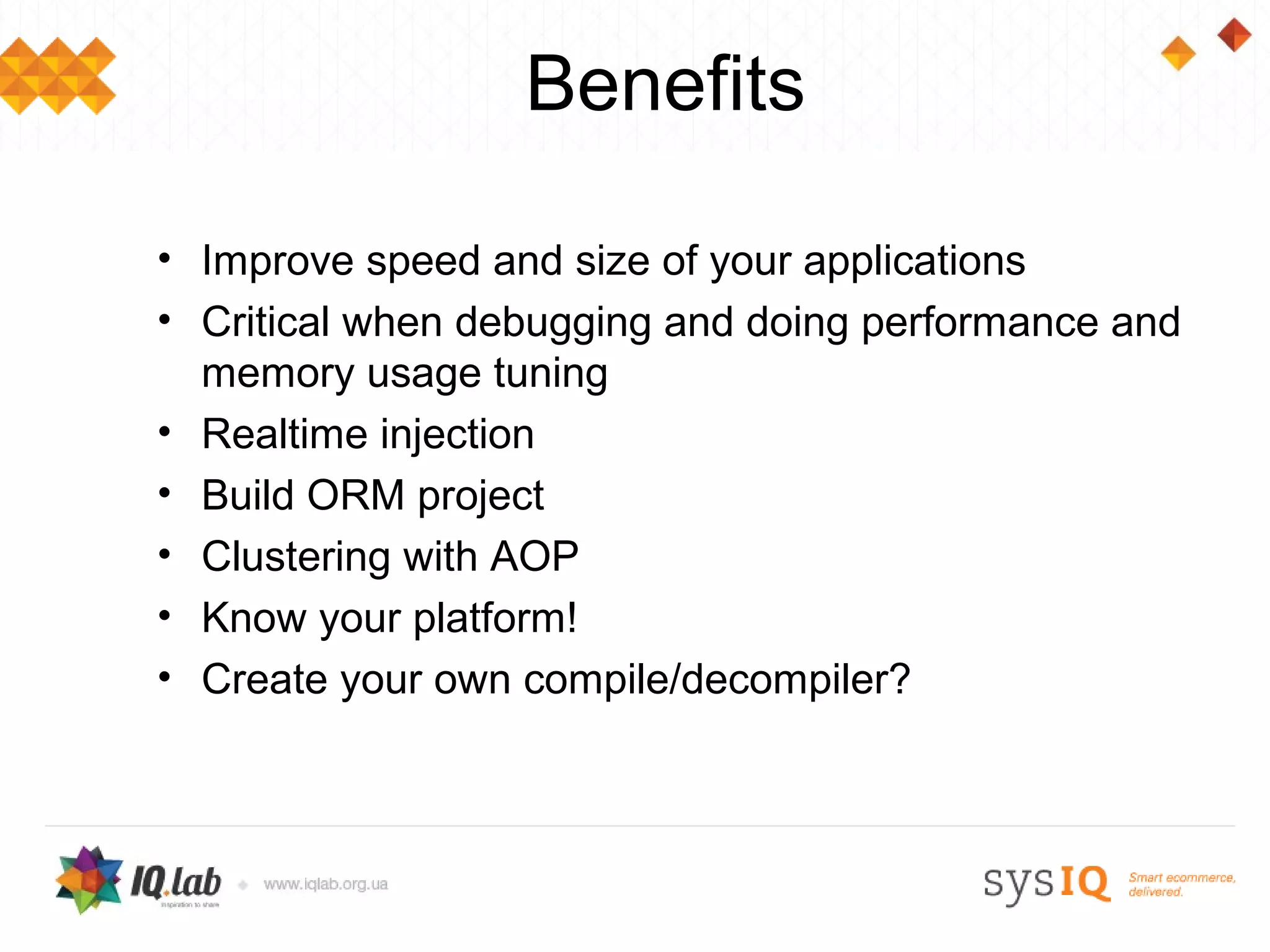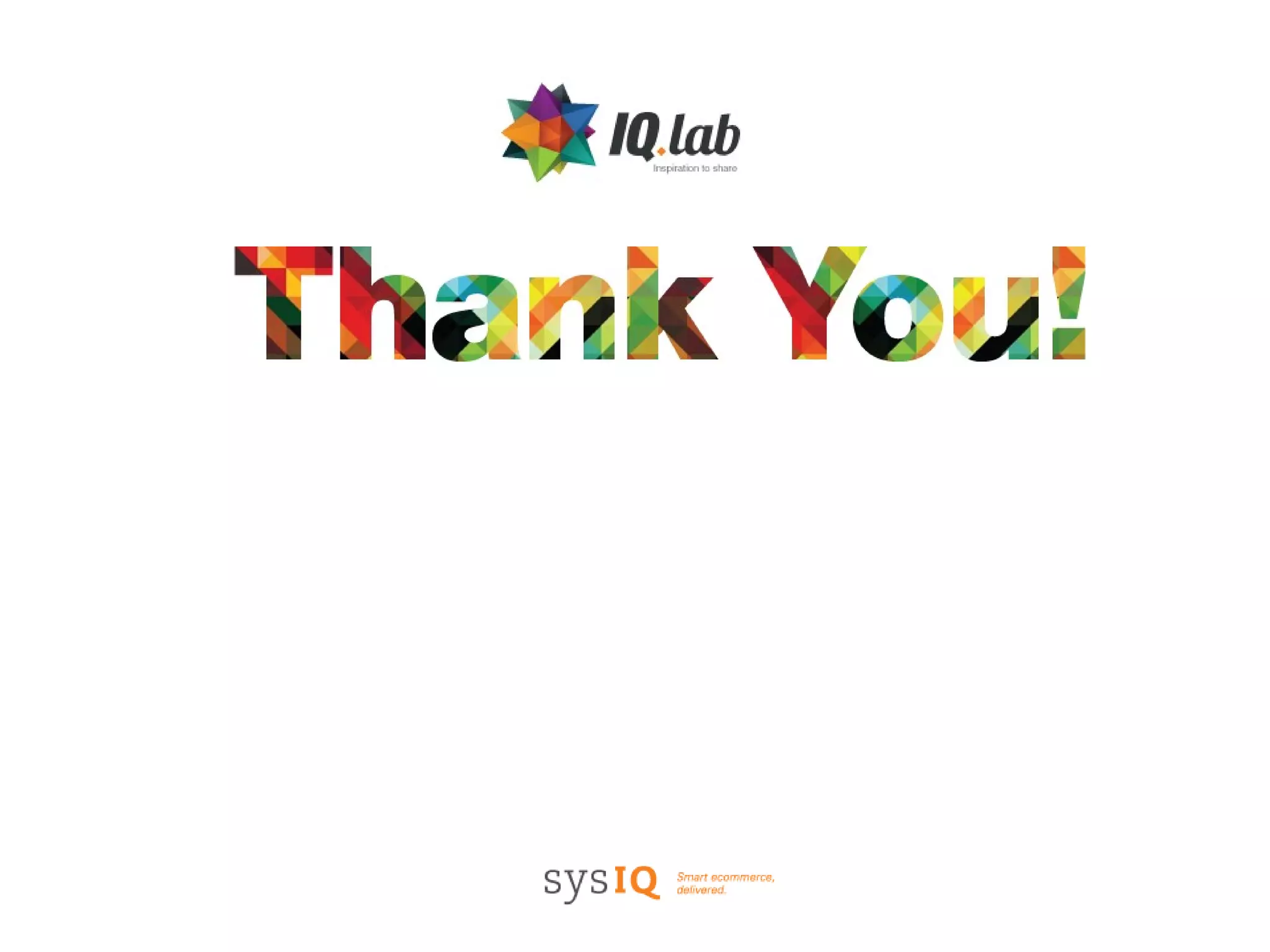The document provides an in-depth guide to Java bytecode, JVM architecture, and related tools such as 'javap' for disassembling class files. It explores various opcodes, bytecode manipulation techniques using libraries like ASM and Javassist, and outlines the benefits of using JRebel for live application updates without redeployment. Additionally, it includes coding examples and performance comparisons between different bytecode manipulation methods.
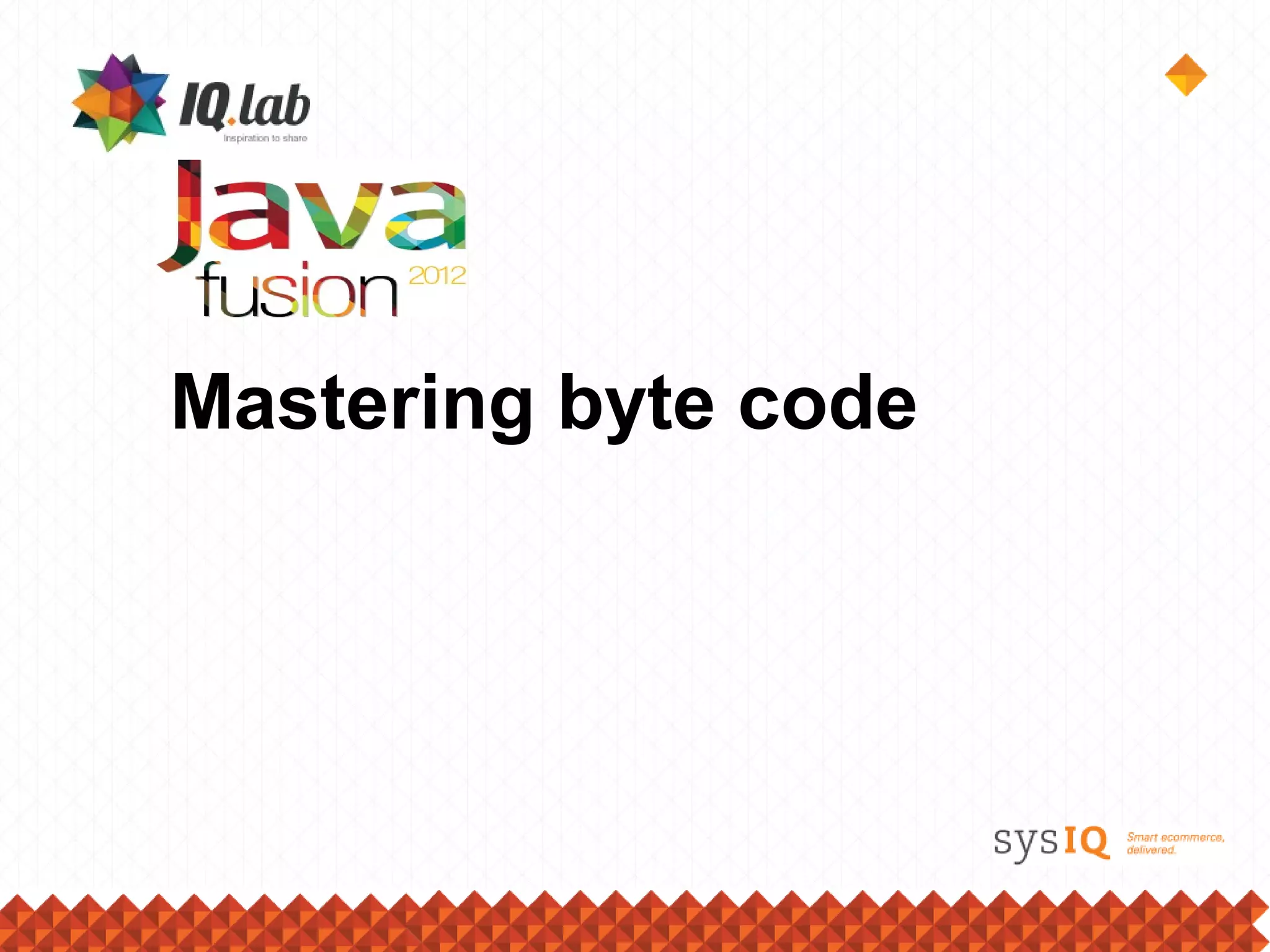
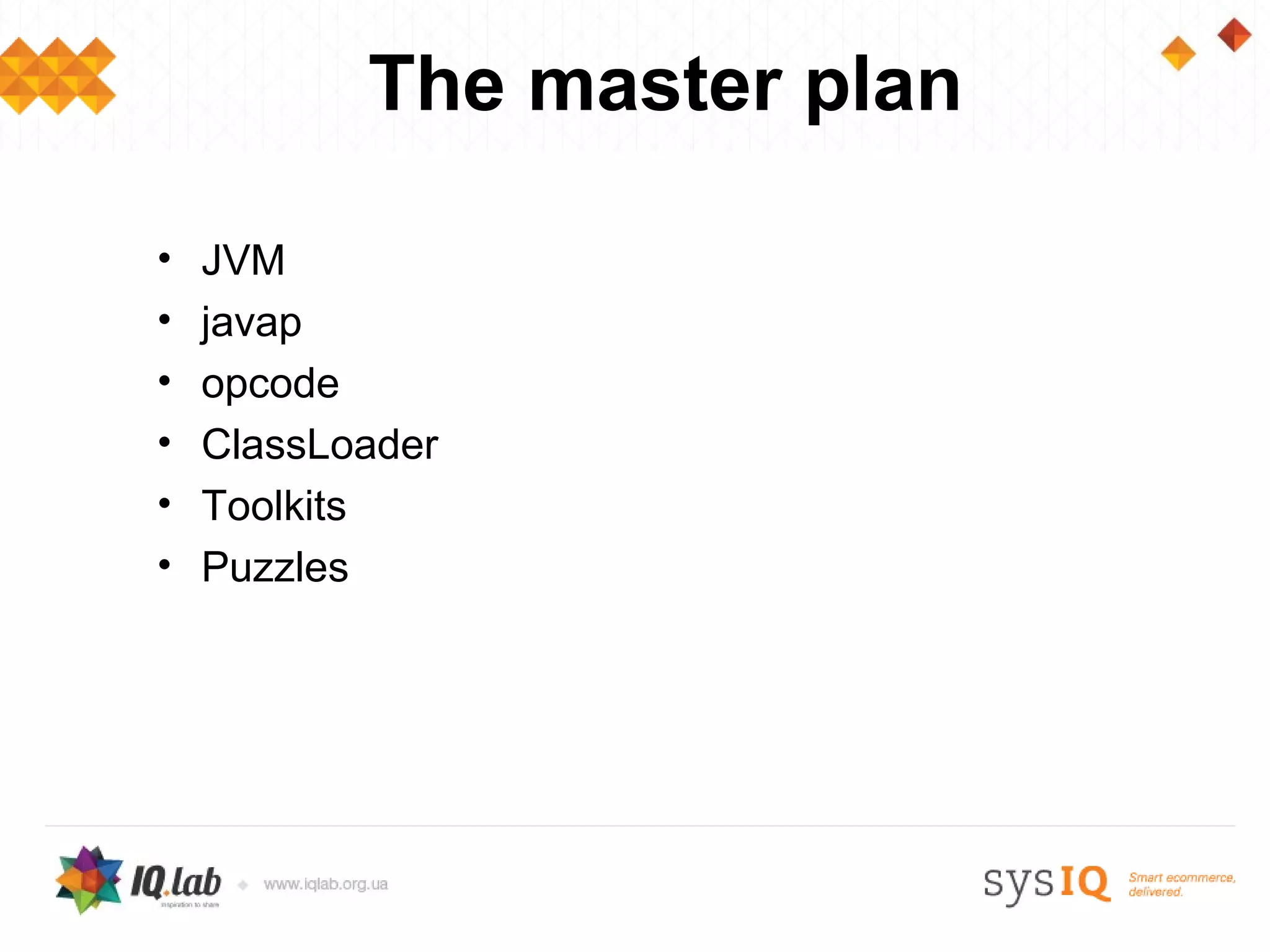
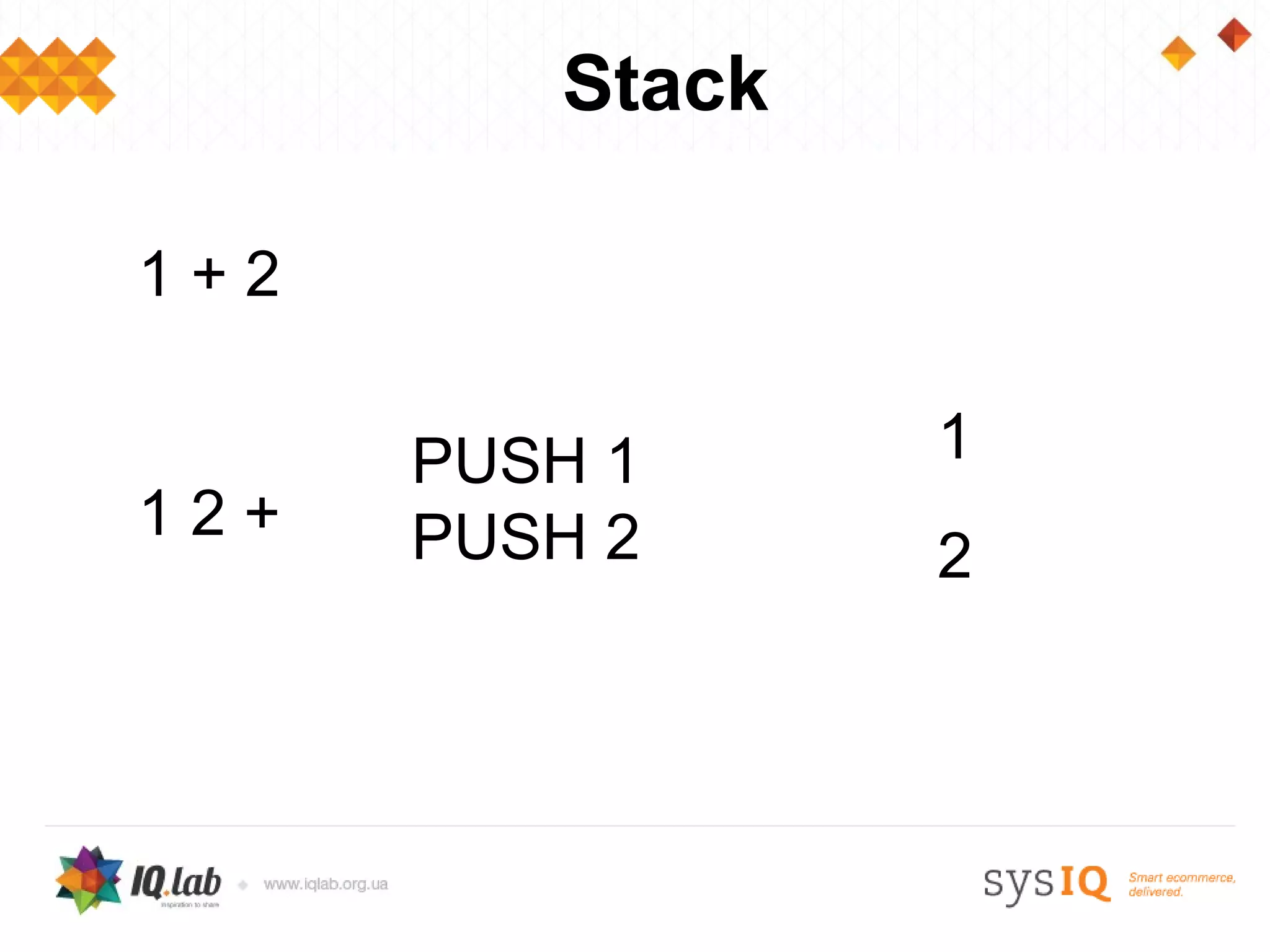
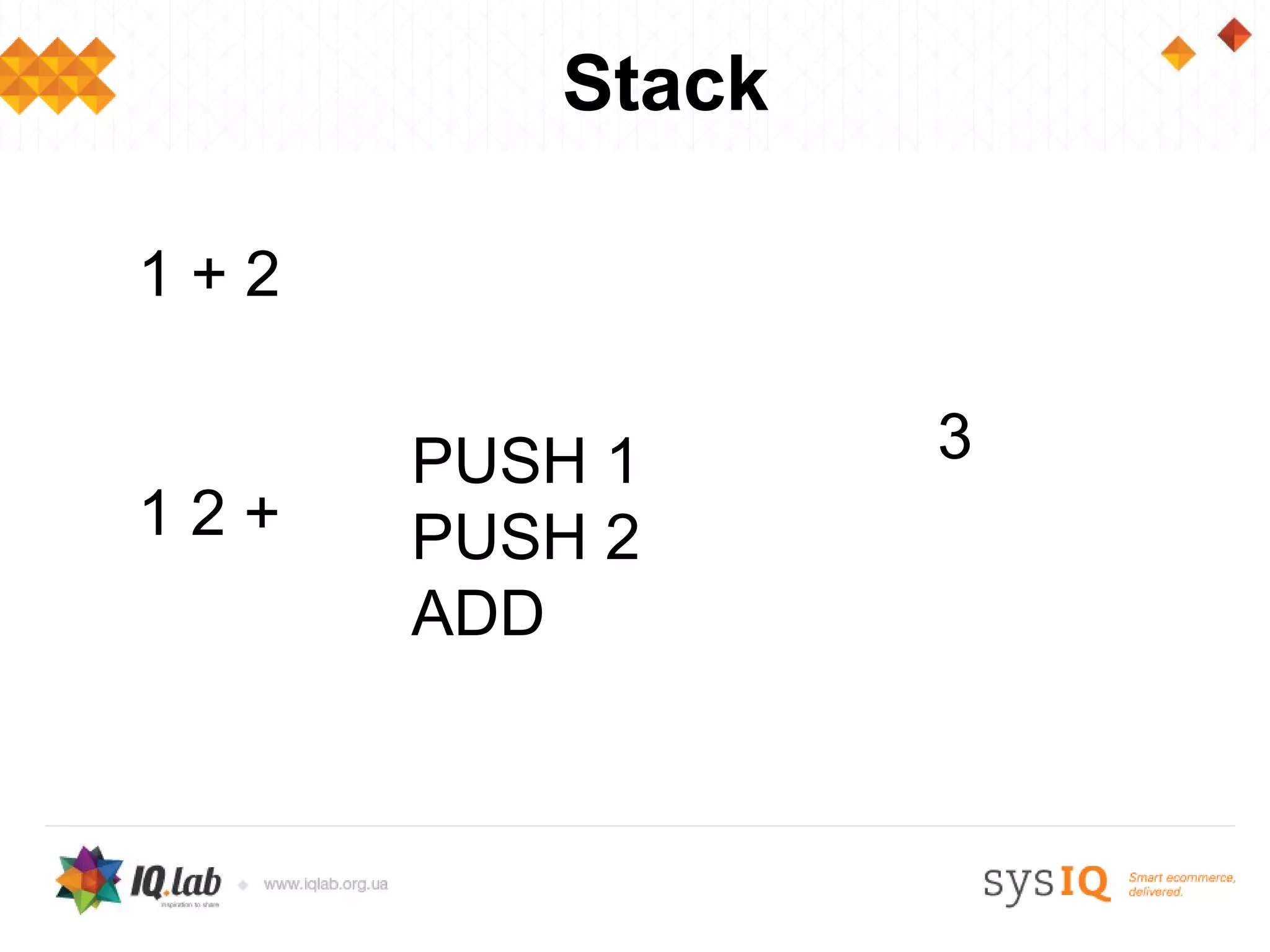
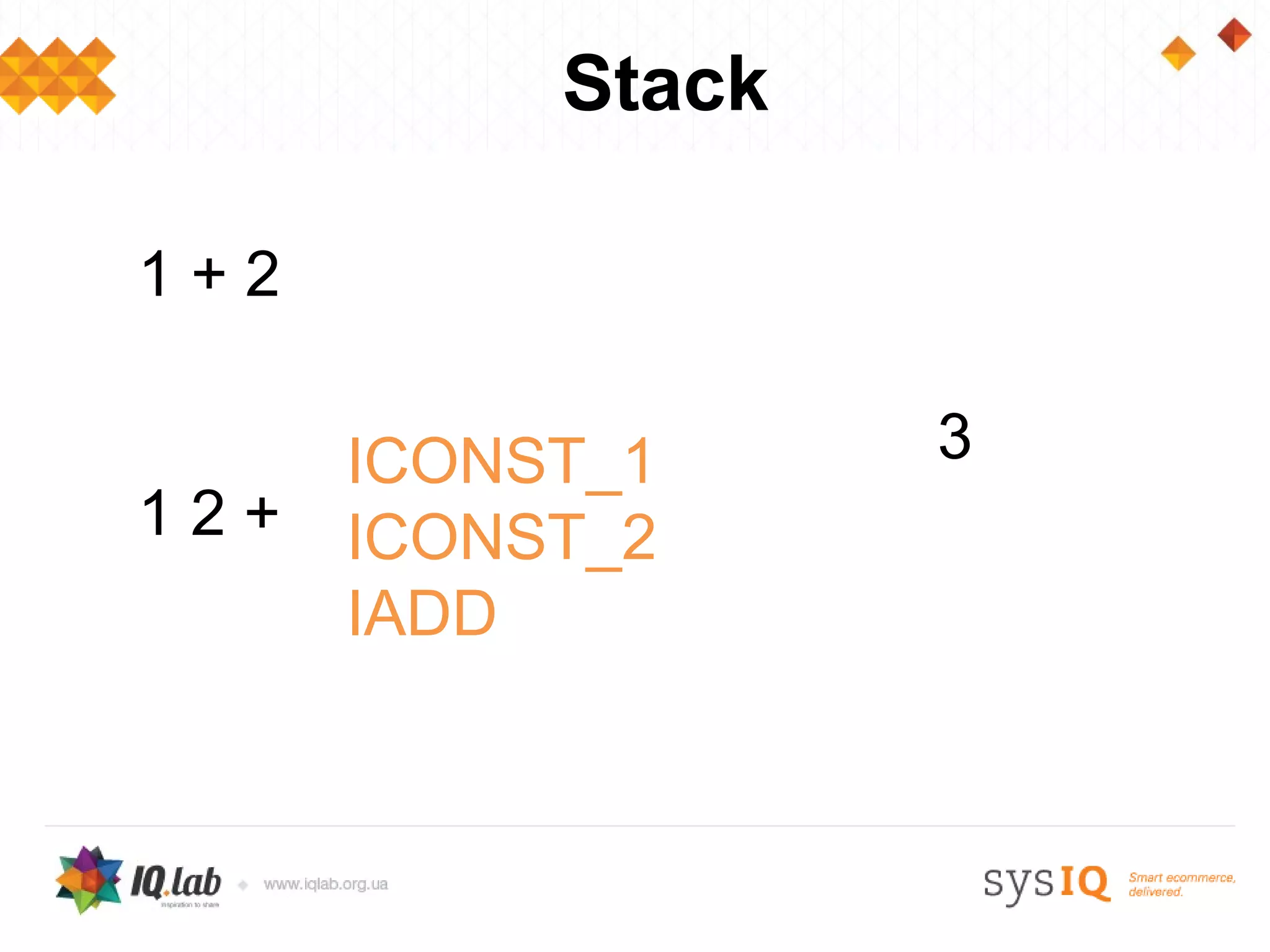
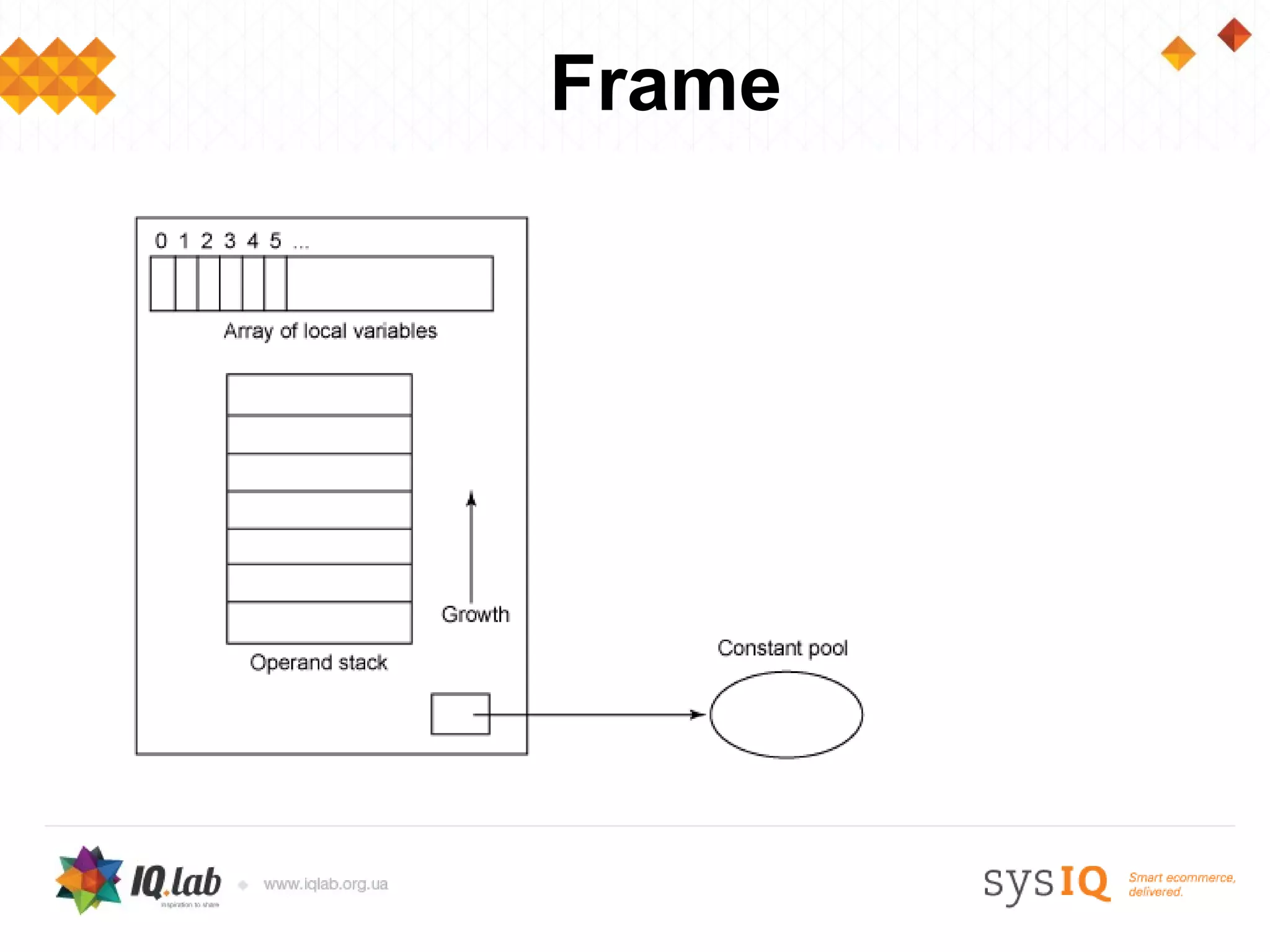
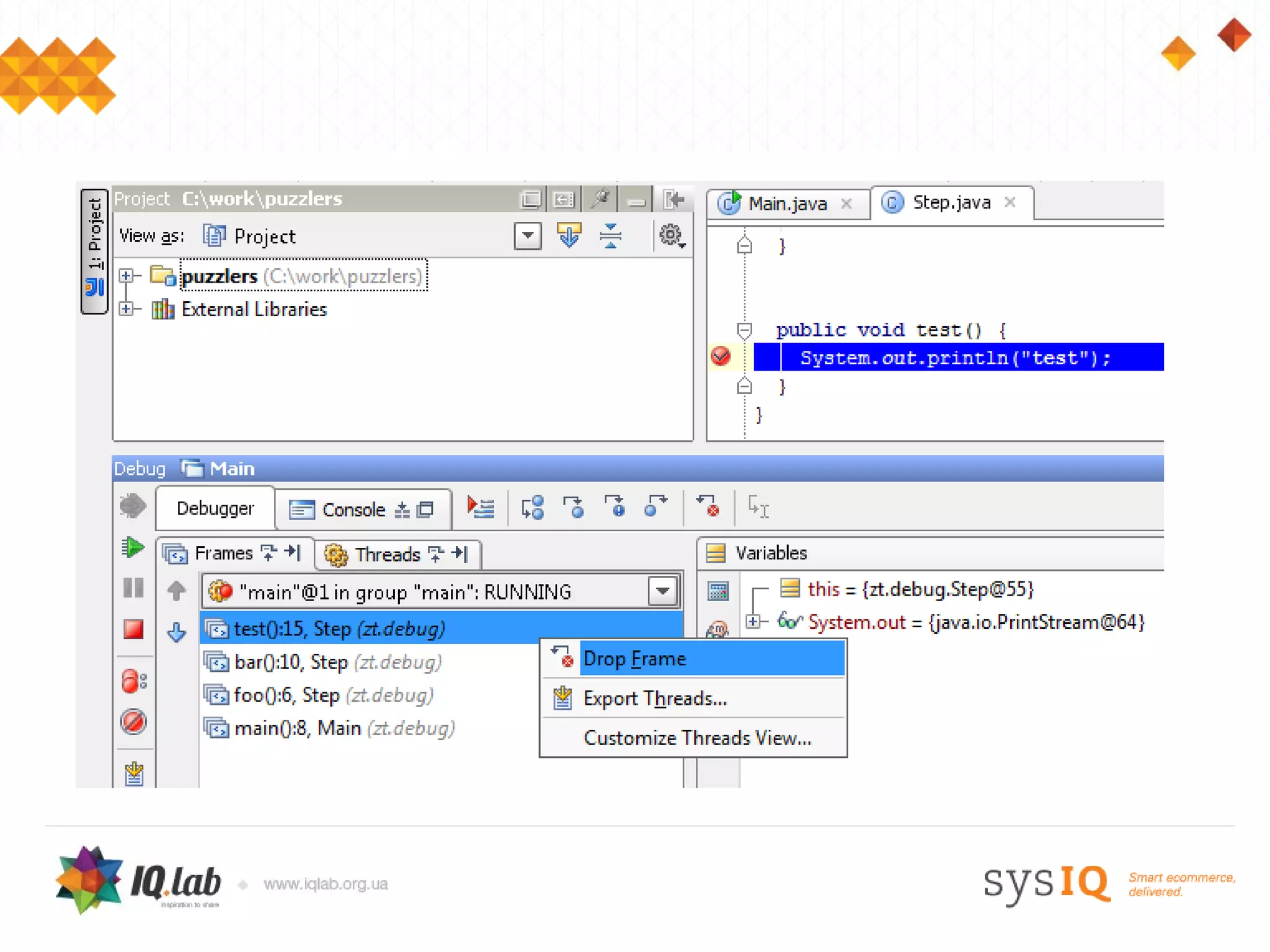
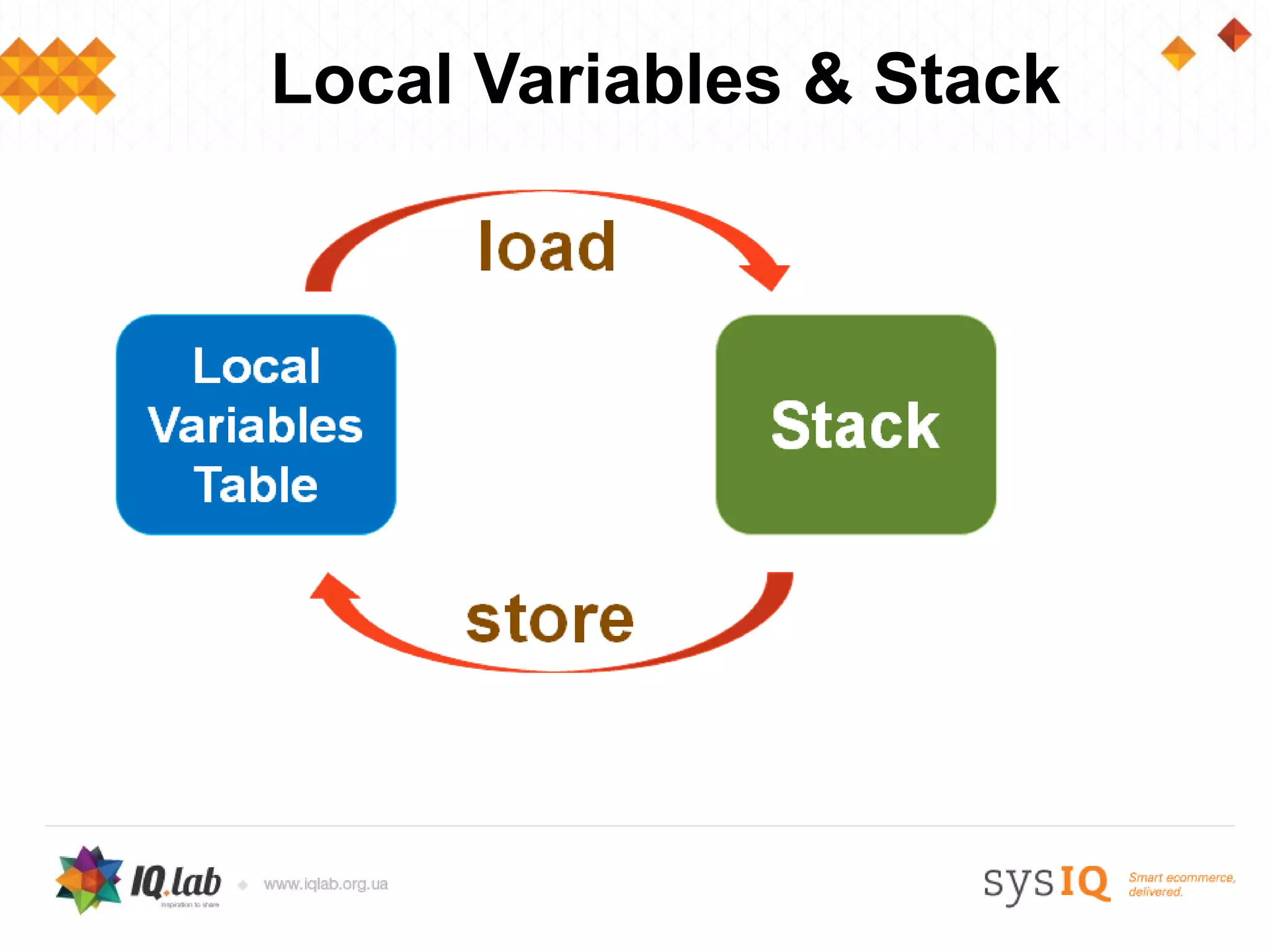
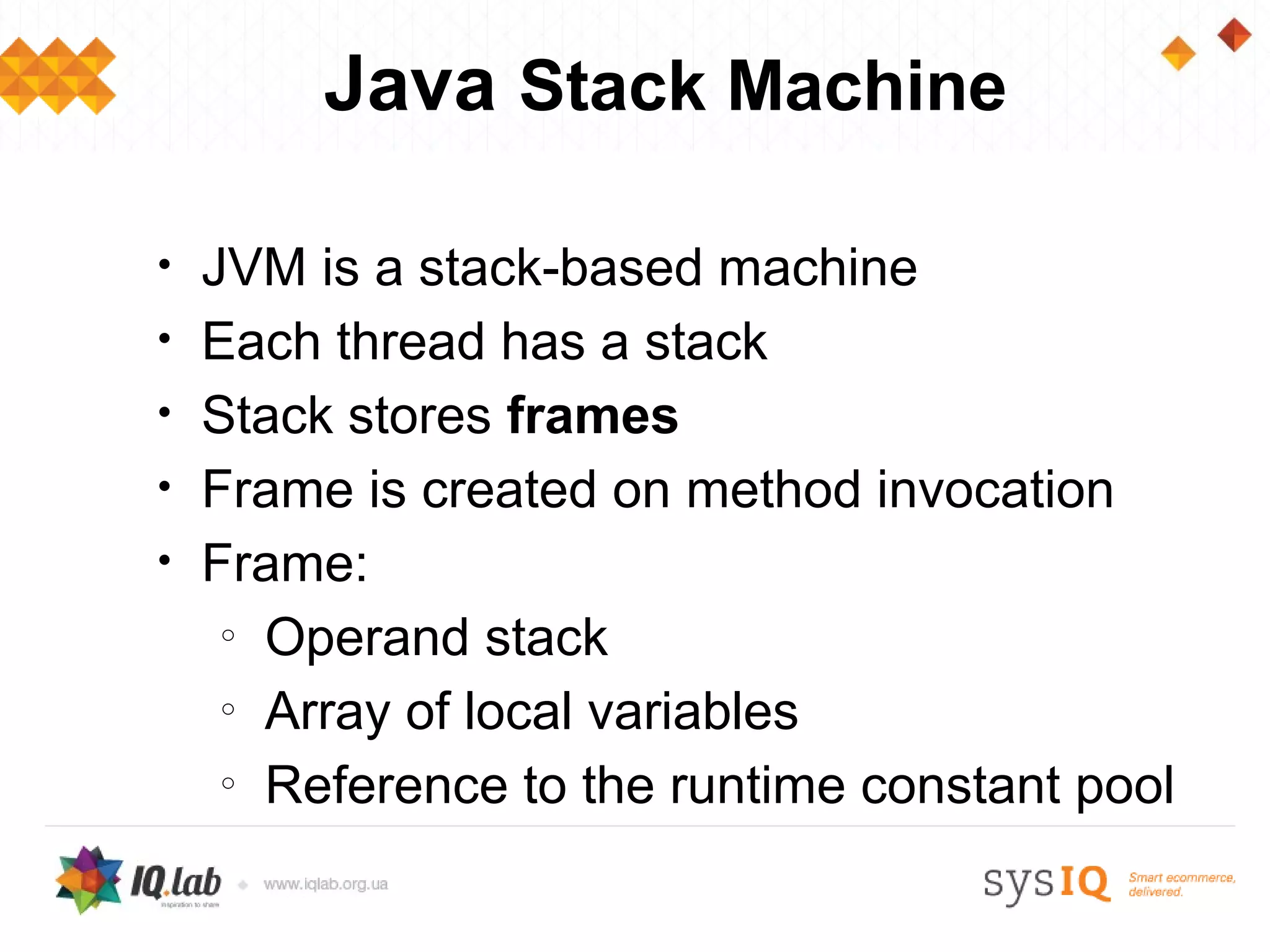
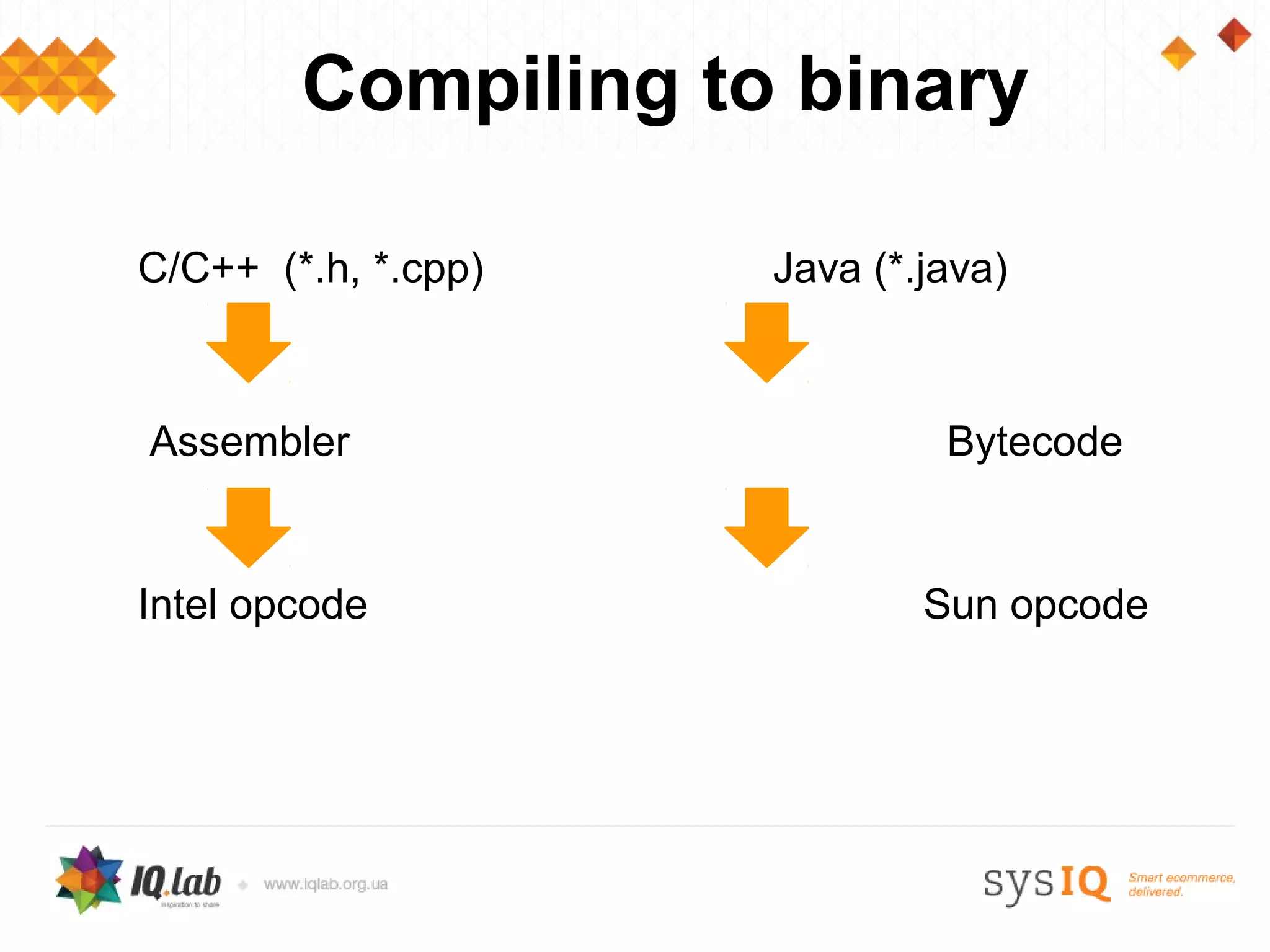
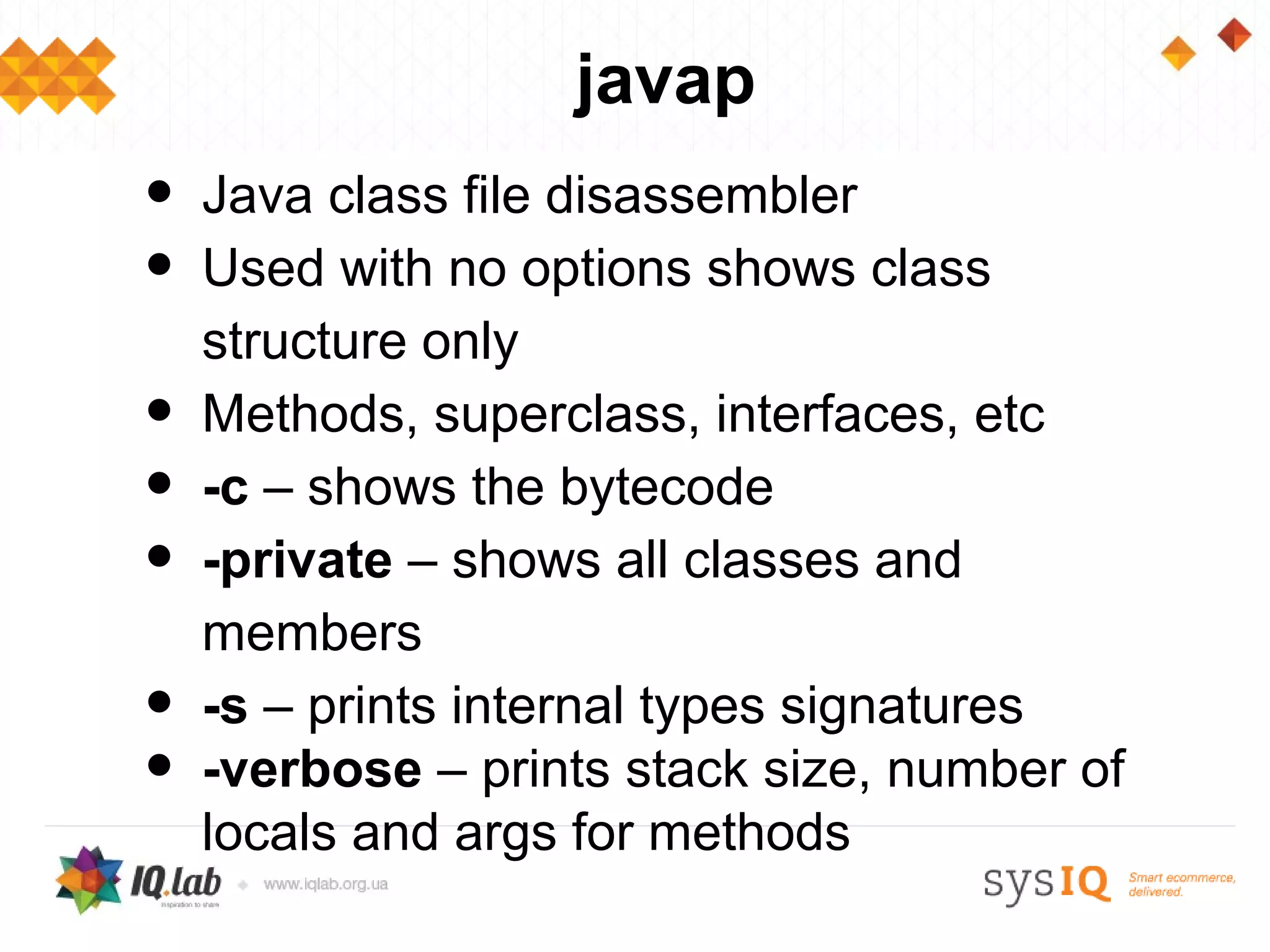
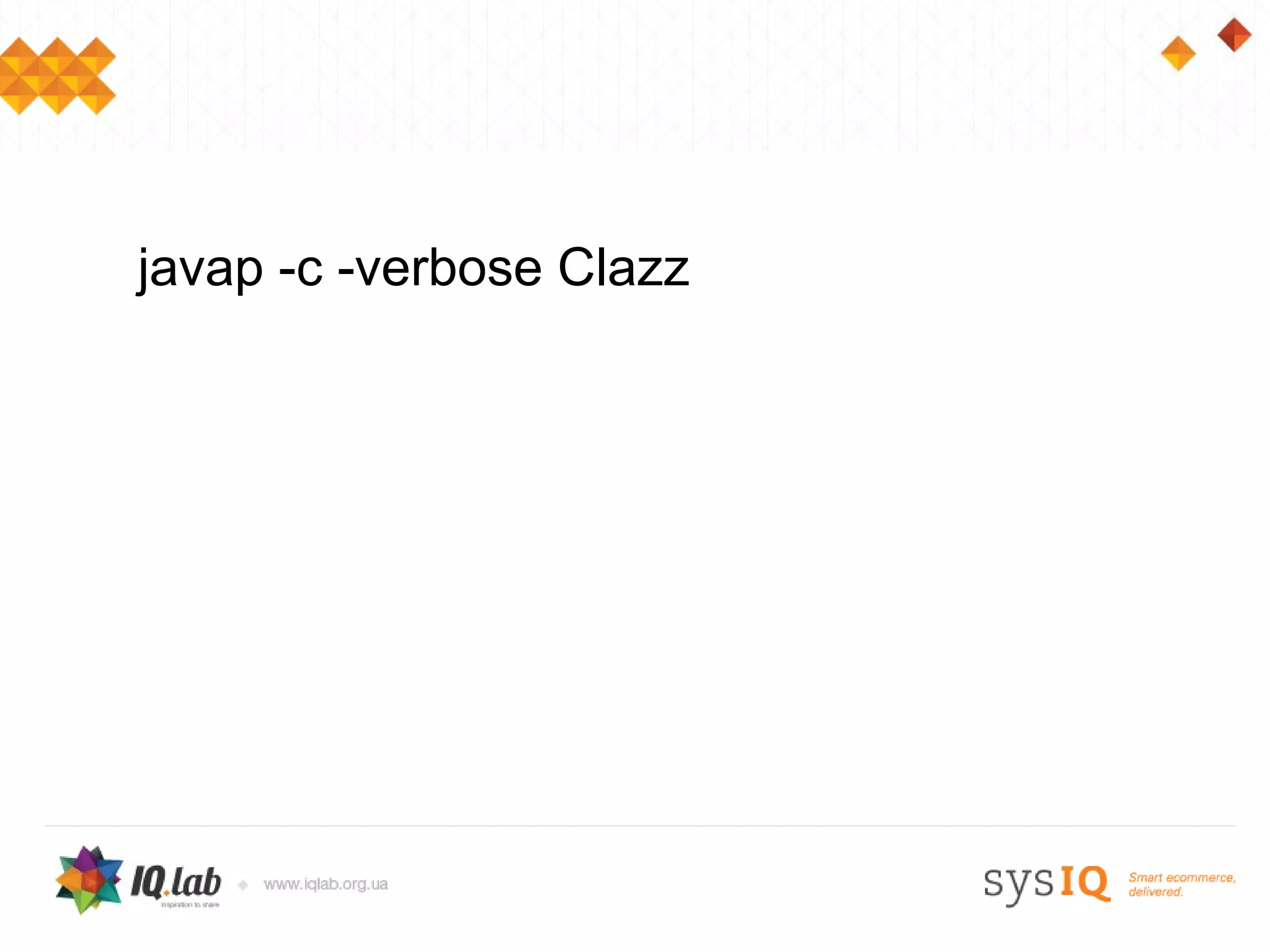
![public class SimpleProgram
{
public static void main(String[] args)
{
System.out.println("Hello Java Fusion!");
}
}](https://image.slidesharecdn.com/mastering-byte-code-java-fusion-sysiq-iqlab-120810073323-phpapp02/75/Mastering-Java-ByteCode-13-2048.jpg)
![public class SimpleProgram
{
public static void main(String[] args)
{
System.out.println("Hello Java Fusion!");
}
}
javap SimpleProgram -c](https://image.slidesharecdn.com/mastering-byte-code-java-fusion-sysiq-iqlab-120810073323-phpapp02/75/Mastering-Java-ByteCode-14-2048.jpg)
![public class SimpleProgram
{
public static void main(String[] args)
{
System.out.println("Hello Java Fusion!");
}
}
javap SimpleProgram -c
Compiled from "SimpleProgram.java"
public class SimpleProgram extends java.lang.Object{
public SimpleProgram();
Code:
0: aload_0
1: invokespecial #1; //Method java/lang/Object."":()V
4: return
public static void main(java.lang.String[]);
Code:
0: getstatic #2; //Field java/lang/System.out:Ljava/io/PrintStream;
3: ldc #3; //String Hello Java Fusion!
5: invokevirtual #4; //Method java/io/PrintStream.println:(Ljava/lang/String;)V
8: return
}](https://image.slidesharecdn.com/mastering-byte-code-java-fusion-sysiq-iqlab-120810073323-phpapp02/75/Mastering-Java-ByteCode-15-2048.jpg)
![public class SimpleProgram
{
public static void main(String[] args)
{
System.out.println("Hello Java Fusion!");
}
}
javap SimpleProgram -c
Compiled from "SimpleProgram.java"
public class SimpleProgram extends java.lang.Object{
public SimpleProgram();// The default constructor
Code:
0: aload_0 //Push this sto stack
1: invokespecial #1; //Method java/lang/Object."":()V //Invoke <init> on this
4: return
public static void main(java.lang.String[]);
Code:
0: getstatic #2; //Field java/lang/System.out:Ljava/io/PrintStream;
3: ldc #3; //String Hello Java Fusion!
5: invokevirtual #4; //Method java/io/PrintStream.println:(Ljava/lang/String;)V
8: return
}](https://image.slidesharecdn.com/mastering-byte-code-java-fusion-sysiq-iqlab-120810073323-phpapp02/75/Mastering-Java-ByteCode-16-2048.jpg)
![public class SimpleProgram
{
public static void main(String[] args)
{
System.out.println("Hello Java Fusion!");
}
}
javap SimpleProgram -c
Compiled from "SimpleProgram.java"
public class SimpleProgram extends java.lang.Object{
public SimpleProgram();
Code:
0: aload_0
1: invokespecial #1; //Method java/lang/Object."":()V
4: return
public static void main(java.lang.String[]);
Code:
0: getstatic #2; //Field java/lang/System.out:Ljava/io/PrintStream; //get static field
3: ldc #3; //String Hello Java Fusion! //Load String to the stack
5: invokevirtual #4; //Method java/io/PrintStream.println:(Ljava/lang/String;)V //invoke method with parameter
8: return
}](https://image.slidesharecdn.com/mastering-byte-code-java-fusion-sysiq-iqlab-120810073323-phpapp02/75/Mastering-Java-ByteCode-17-2048.jpg)
![public class SimpleProgram
{
public static void main(String[] args)
{
System.out.println("Hello Java Fusion!");
}
}
javap SimpleProgram -c
Compiled from "SimpleProgram.java"
public class SimpleProgram extends java.lang.Object{
public SimpleProgram();
Code:
0: aload_0
1: invokespecial #1; //Method java/lang/Object."":()V
4: return
public static void main(java.lang.String[]);
Code:
0: getstatic #2; //Field java/lang/System.out:Ljava/io/PrintStream;
3: ldc #3; //String Hello Java Fusion!
5: invokevirtual #4; //Method java/io/PrintStream.println:(Ljava/lang/String;)V
8: return
}](https://image.slidesharecdn.com/mastering-byte-code-java-fusion-sysiq-iqlab-120810073323-phpapp02/75/Mastering-Java-ByteCode-18-2048.jpg)
![public class SimpleProgram
{
public static void main(String[] args)
{
System.out.println("Hello Java Fusion!");
}
}
javap SimpleProgram -c -verbose
Compiled from "SimpleProgram.java“
public class SimpleProgram extends java.lang.Object
SourceFile: "SimpleProgram.java"
minor version: 0
major version: 50
Constant pool:
const #1 = Method #6.#20; // java/lang/Object."<init>":()V
const #2 = Field #21.#22; // java/lang/System.out:Ljava/io/PrintStream;
const #3 = String #23; // Hello Java Fusion!
const #4 = Method #24.#25; // java/io/PrintStream.println:(Ljava/lang/String;)V
const #5 = class #26; // SimpleProgram
const #6 = class #27; // java/lang/Object
сonst #7 = Asciz <init>;
...](https://image.slidesharecdn.com/mastering-byte-code-java-fusion-sysiq-iqlab-120810073323-phpapp02/75/Mastering-Java-ByteCode-19-2048.jpg)
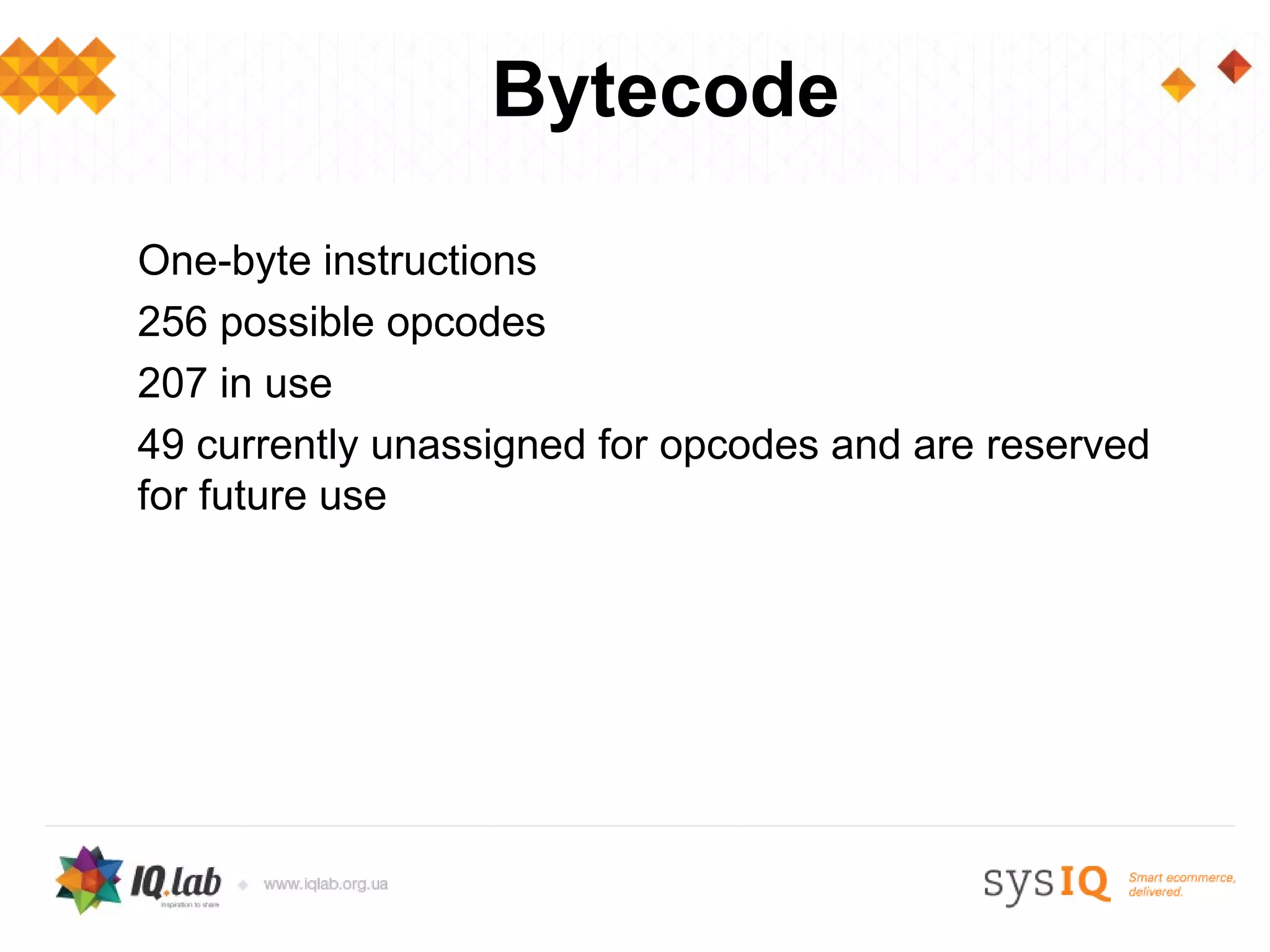
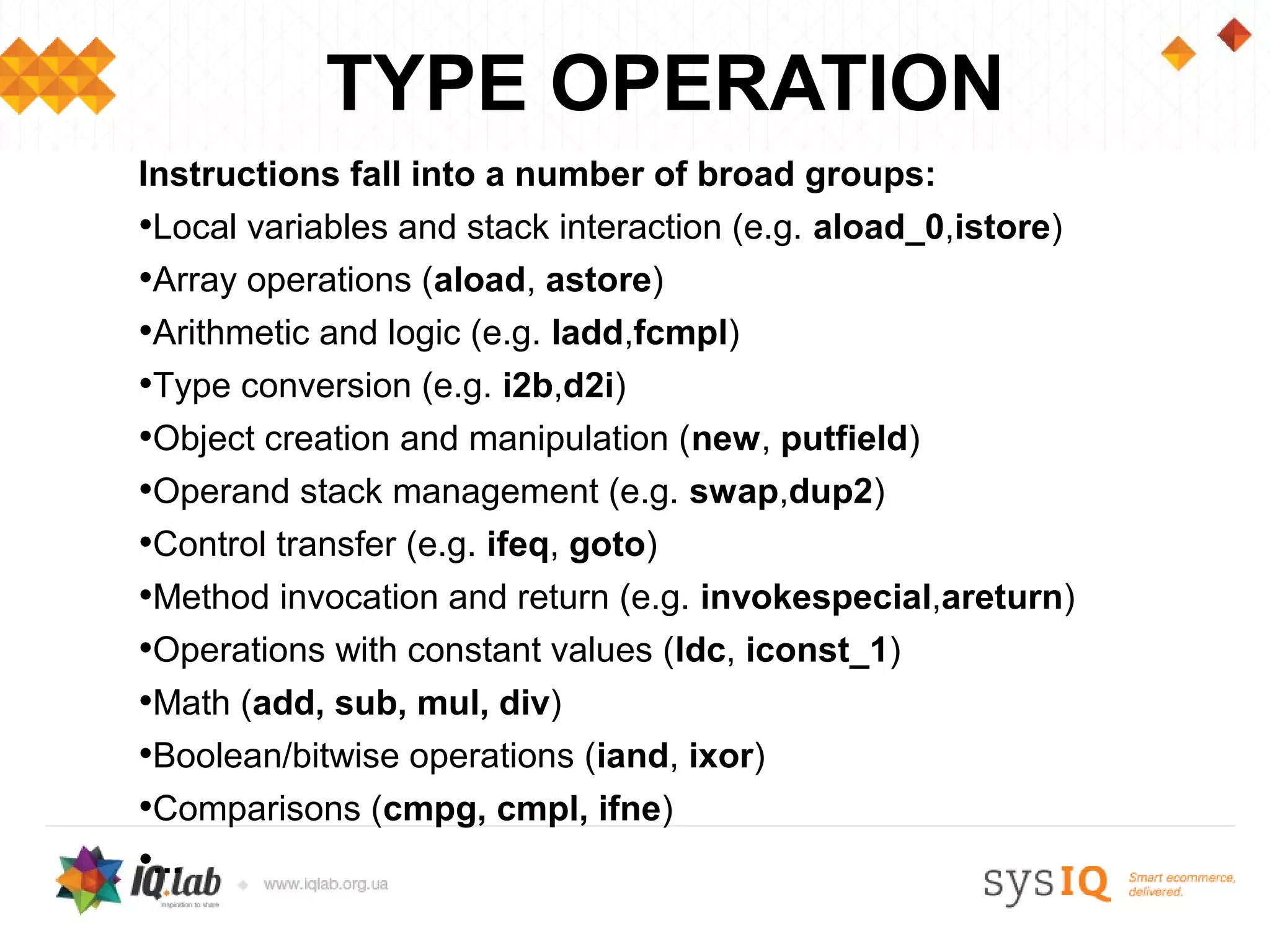
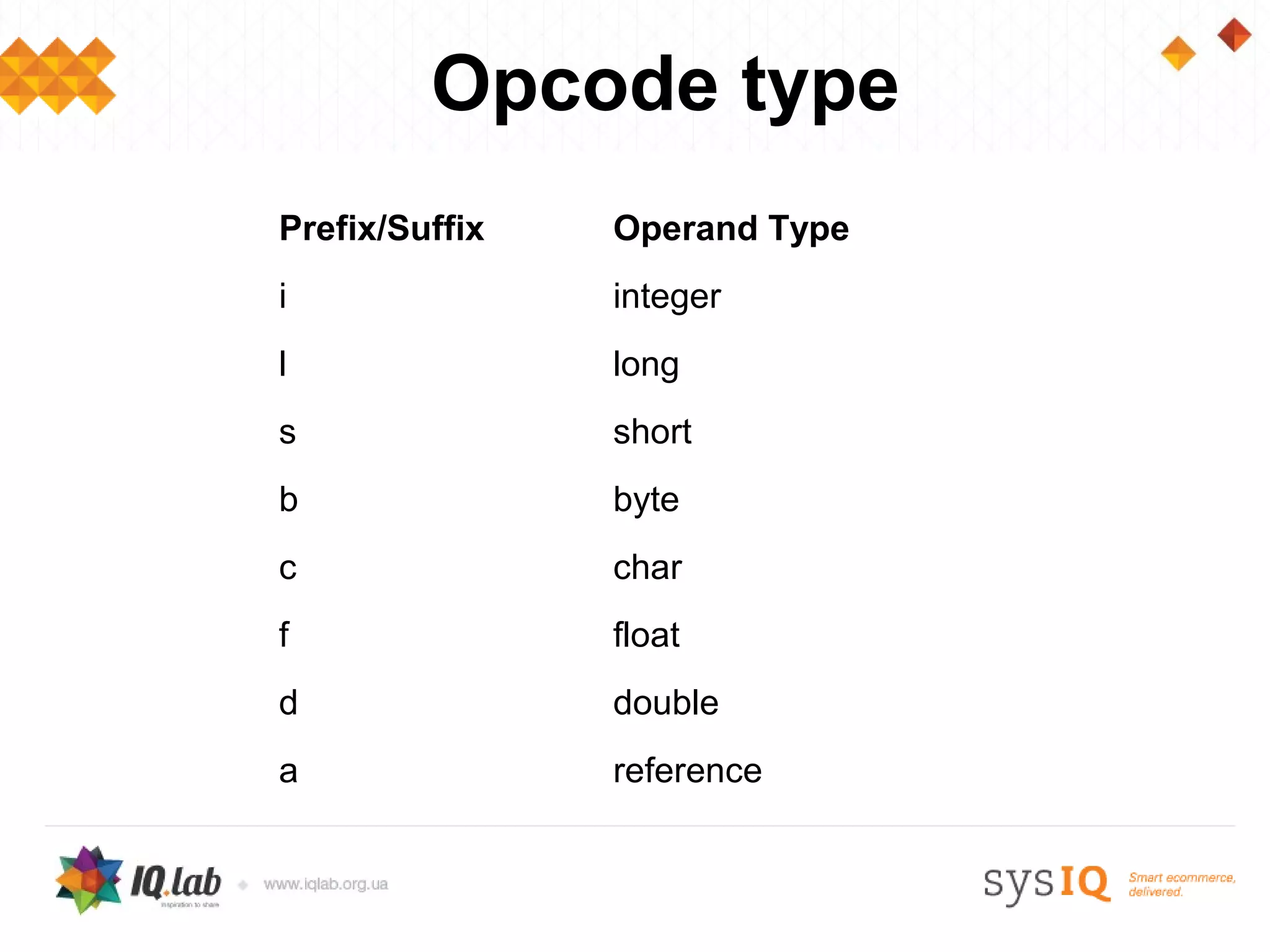
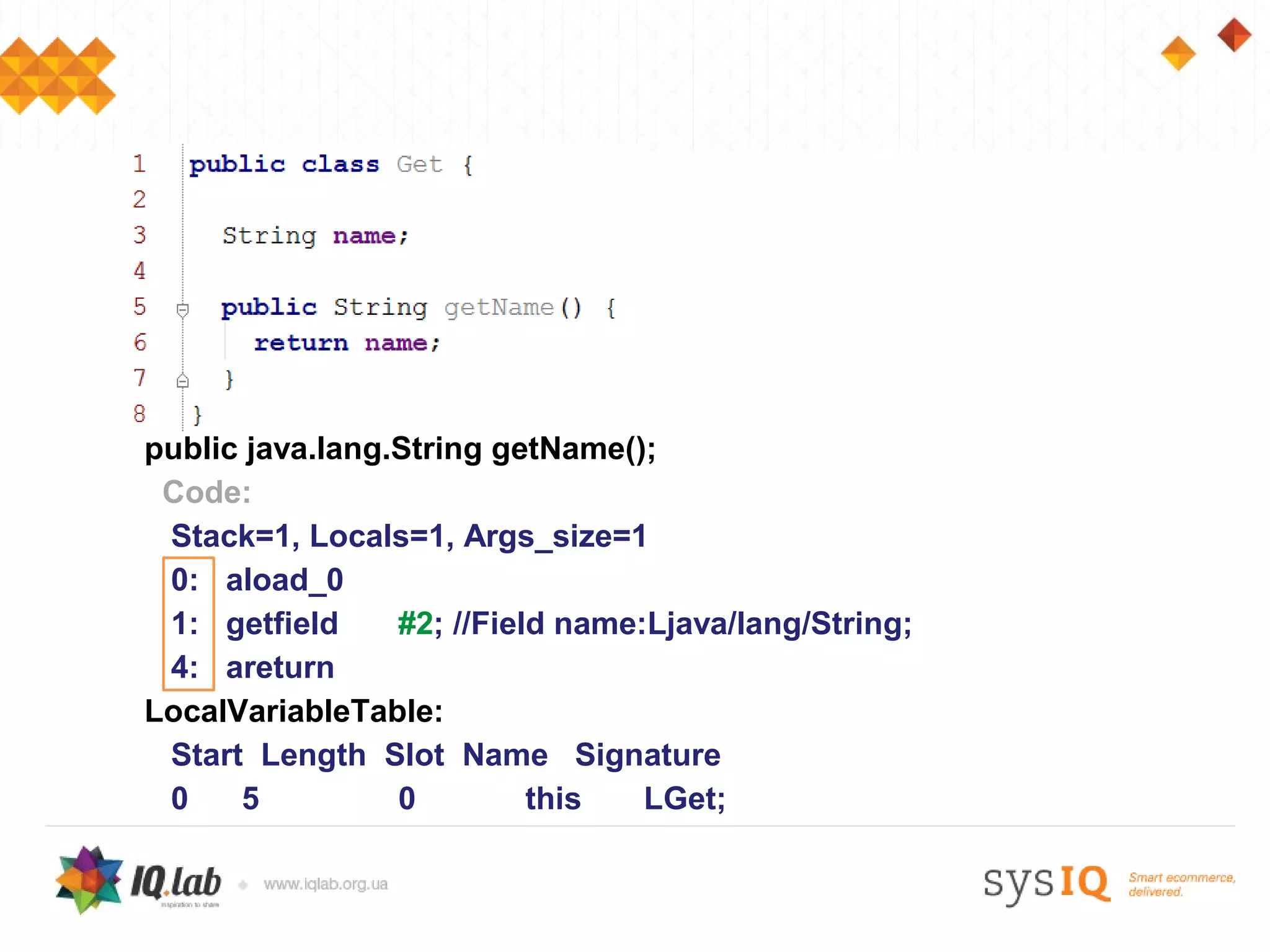
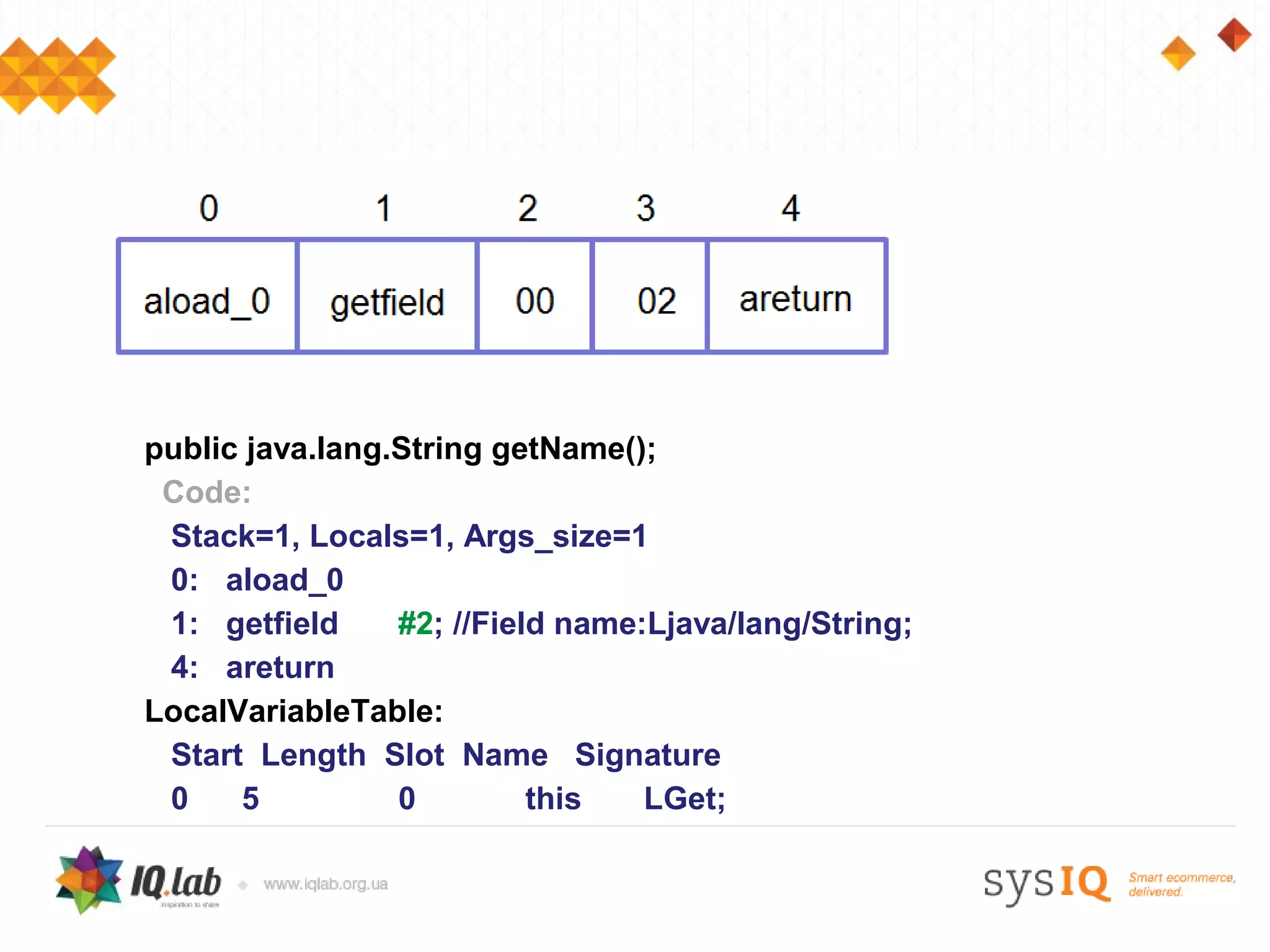
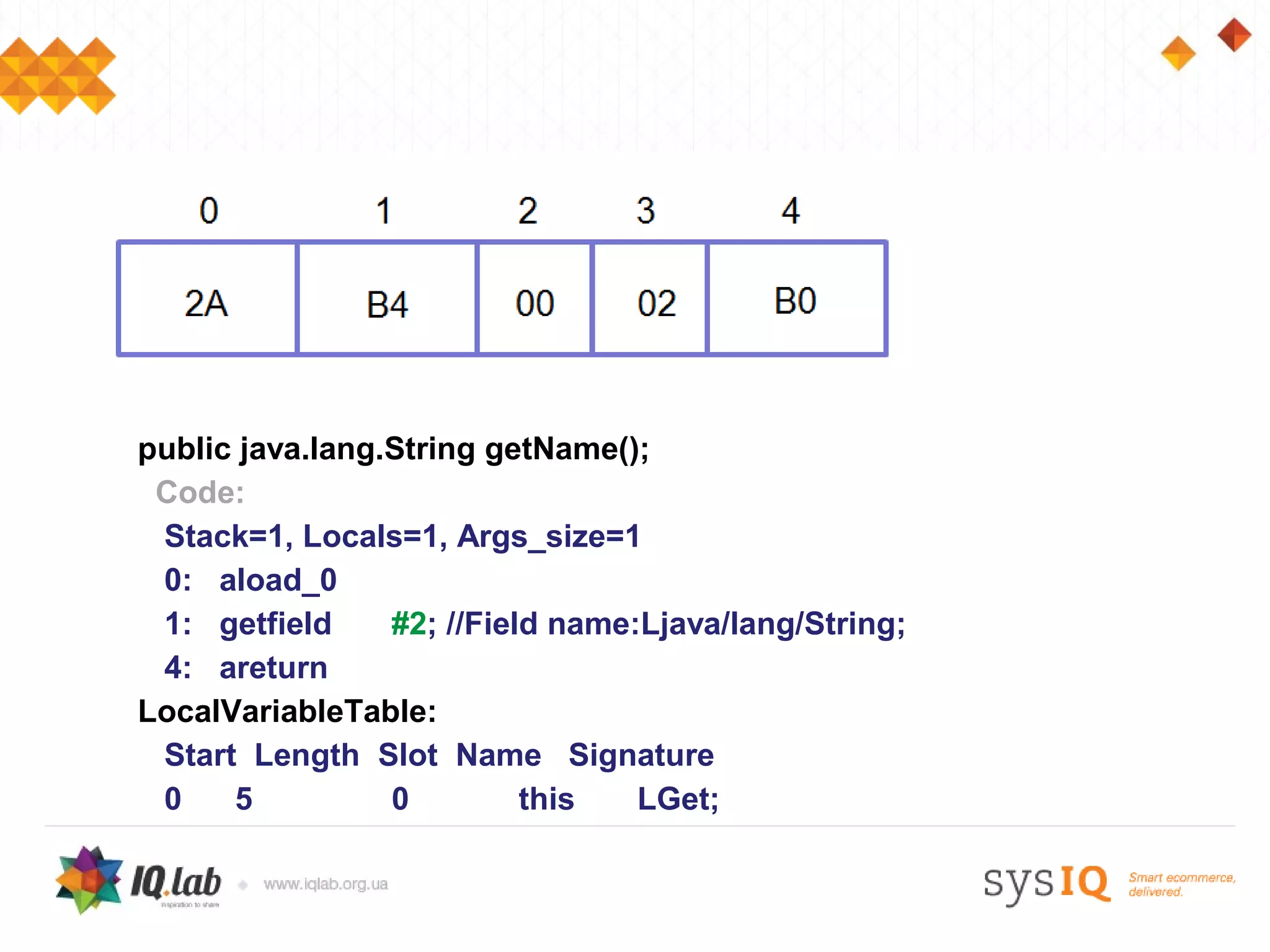
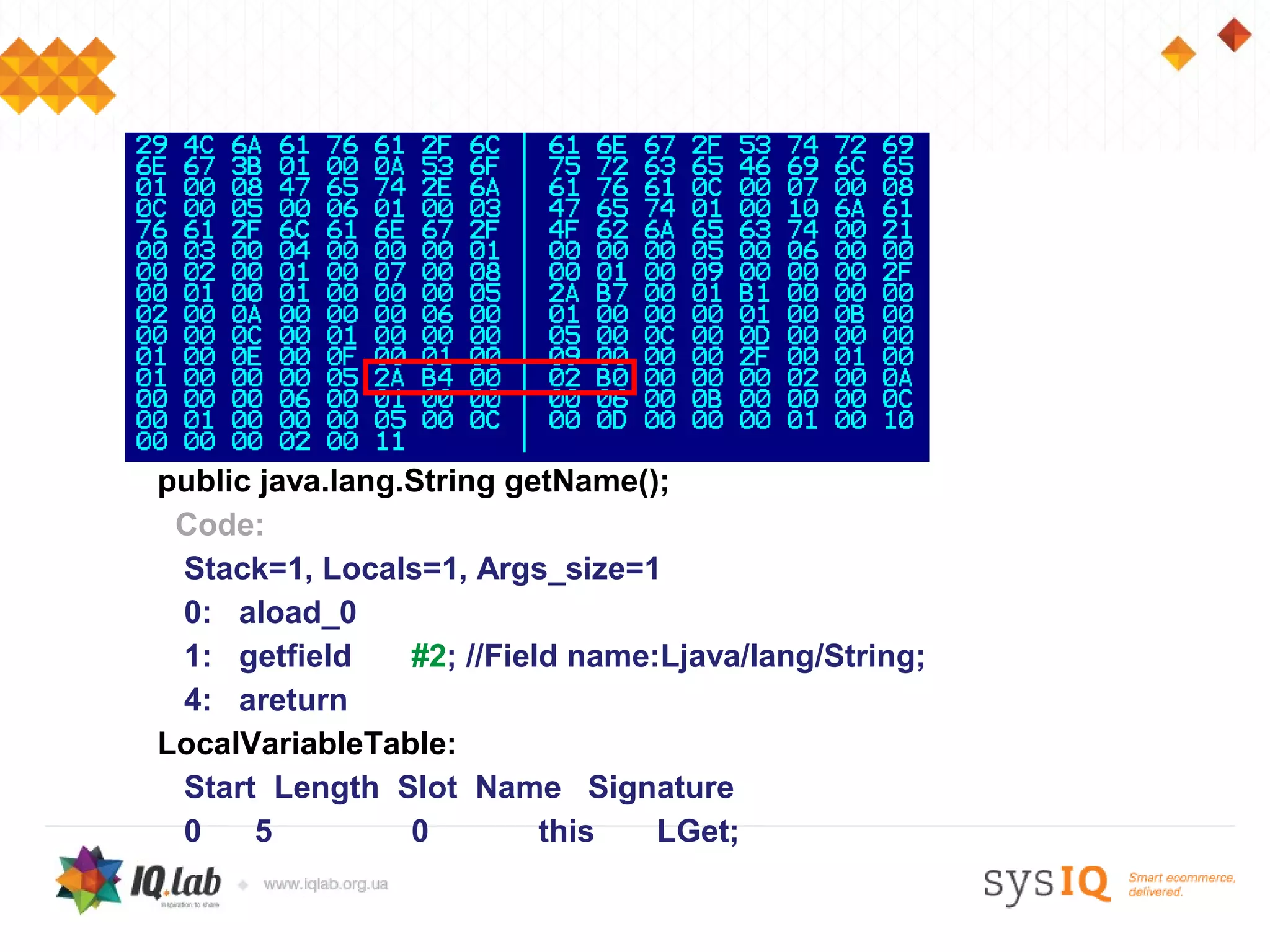
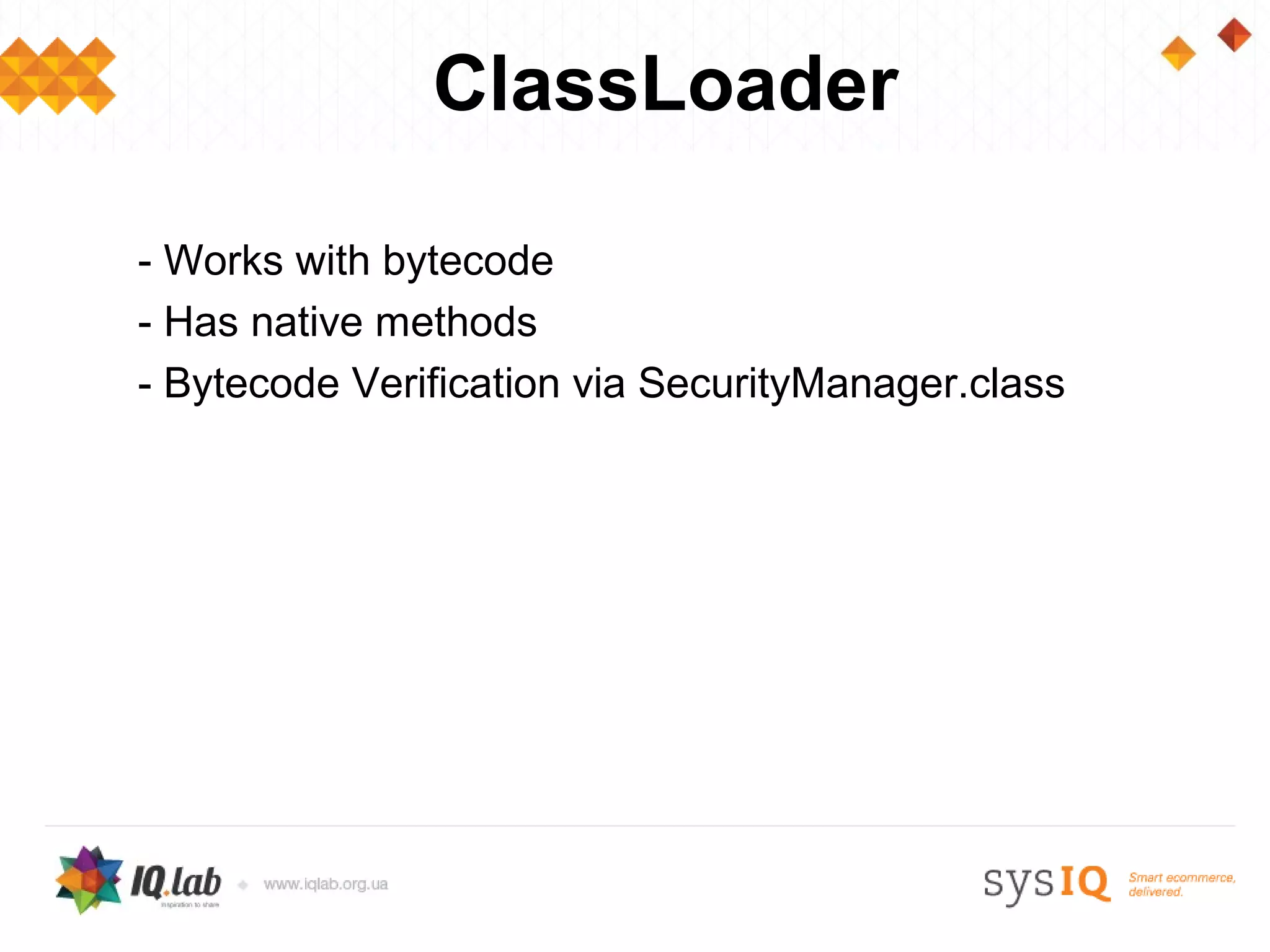
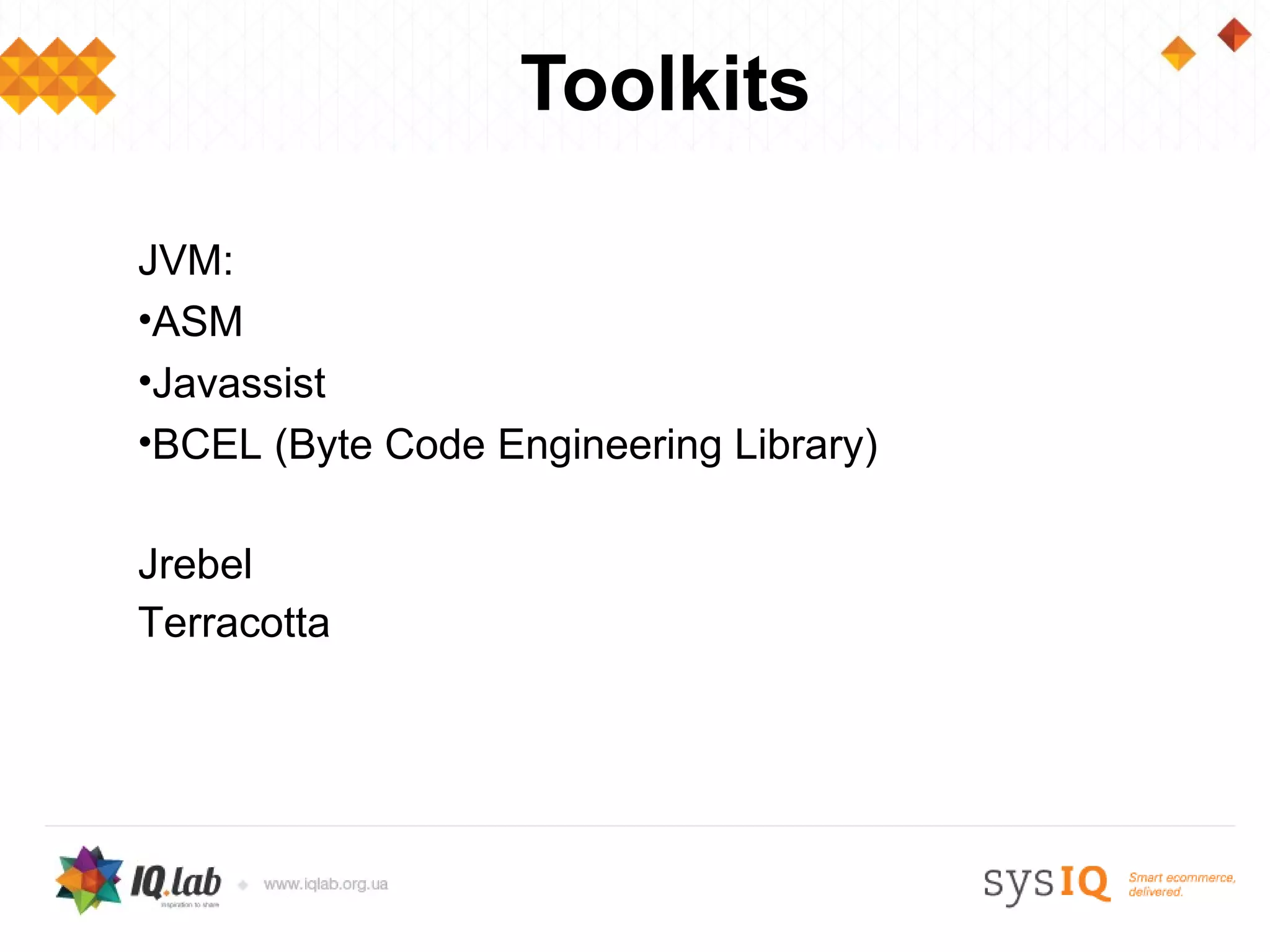
![Common sample
public class SimpleProgram
{
public static void main(String[] args)
{
System.out.println("Hello Java Fusion!");
}
}](https://image.slidesharecdn.com/mastering-byte-code-java-fusion-sysiq-iqlab-120810073323-phpapp02/75/Mastering-Java-ByteCode-29-2048.jpg)
![ASM sample
public class ASMSample extends ClassLoader implements Opcodes {
{
public static void main(String[] args)
{
ClassWriter cw = new ClassWriter(ClassWriter.COMPUTE_MAXS);
cw.visit(V1_1, ACC_PUBLIC, "SimpleProgram", null, "java/lang/Object", null);
}
}](https://image.slidesharecdn.com/mastering-byte-code-java-fusion-sysiq-iqlab-120810073323-phpapp02/75/Mastering-Java-ByteCode-30-2048.jpg)
![ASM sample
public class ASMSample extends ClassLoader implements Opcodes {
{
public static void main(String[] args)
{
ClassWriter cw = new ClassWriter(ClassWriter.COMPUTE_MAXS);
cw.visit(V1_1, ACC_PUBLIC, "SimpleProgram", null, "java/lang/Object", null); // creates a GeneratorAdapter
for the (implicit) constructor
Method m = Method.getMethod("void <init> ()");
GeneratorAdapter mg = new GeneratorAdapter(ACC_PUBLIC, m, null, null, cw);
mg.loadThis();
mg.invokeConstructor(Type.getType(Object.class), m);
mg.returnValue();
mg.endMethod();
}
}](https://image.slidesharecdn.com/mastering-byte-code-java-fusion-sysiq-iqlab-120810073323-phpapp02/75/Mastering-Java-ByteCode-31-2048.jpg)
![ASM sample
public class ASMSample extends ClassLoader implements Opcodes {
{
public static void main(String[] args)
{
ClassWriter cw = new ClassWriter(ClassWriter.COMPUTE_MAXS);
cw.visit(V1_1, ACC_PUBLIC, "SimpleProgram", null, "java/lang/Object", null);
// creates a GeneratorAdapter for the (implicit) constructor
Method m = Method.getMethod("void <init> ()");
GeneratorAdapter mg = new GeneratorAdapter(ACC_PUBLIC, m, null, null, cw);
mg.loadThis();
mg.invokeConstructor(Type.getType(Object.class), m);
mg.returnValue();
mg.endMethod(); // creates a GeneratorAdapter for the 'main' method
m = Method.getMethod("void main (String[])");
mg = new GeneratorAdapter(ACC_PUBLIC + ACC_STATIC, m, null, null, cw);
mg.getStatic(Type.getType(System.class), "out",Type.getType(PrintStream.class));
mg.push("Hello Java Fusion!");
mg.invokeVirtual(Type.getType(PrintStream.class),
Method.getMethod("void println (String)"));
mg.returnValue();
mg.endMethod();
cw.visitEnd();
}
}](https://image.slidesharecdn.com/mastering-byte-code-java-fusion-sysiq-iqlab-120810073323-phpapp02/75/Mastering-Java-ByteCode-32-2048.jpg)
![ASM sample
public class ASMSample extends ClassLoader implements Opcodes {
{
public static void main(String[] args)
{
ClassWriter cw = new ClassWriter(ClassWriter.COMPUTE_MAXS);
cw.visit(V1_1, ACC_PUBLIC, "SimpleProgram", null, "java/lang/Object", null);
// creates a GeneratorAdapter for the (implicit) constructor
Method m = Method.getMethod("void <init> ()");
GeneratorAdapter mg = new GeneratorAdapter(ACC_PUBLIC, m, null, null, cw);
mg.loadThis();
mg.invokeConstructor(Type.getType(Object.class), m);
mg.returnValue();
mg.endMethod();
// creates a GeneratorAdapter for the 'main' method
m = Method.getMethod("void main (String[])");
mg = new GeneratorAdapter(ACC_PUBLIC + ACC_STATIC, m, null, null, cw);
mg.getStatic(Type.getType(System.class), "out",Type.getType(PrintStream.class));
mg.push("Hello Java Fusion!");
mg.invokeVirtual(Type.getType(PrintStream.class),
Method.getMethod("void println (String)"));
mg.returnValue();
mg.endMethod();
cw.visitEnd(); byte[] code = cw.toByteArray();
ASMSample loader = new ASMSample ();
Class<?> exampleClass = loader.defineClass("SimpleProgram", code, 0, code.length);
// uses the dynamically generated class to print 'Hello Java Fusion'
exampleClass.getMethods()[0].invoke(null, new Object[] { null } );
}
}](https://image.slidesharecdn.com/mastering-byte-code-java-fusion-sysiq-iqlab-120810073323-phpapp02/75/Mastering-Java-ByteCode-33-2048.jpg)
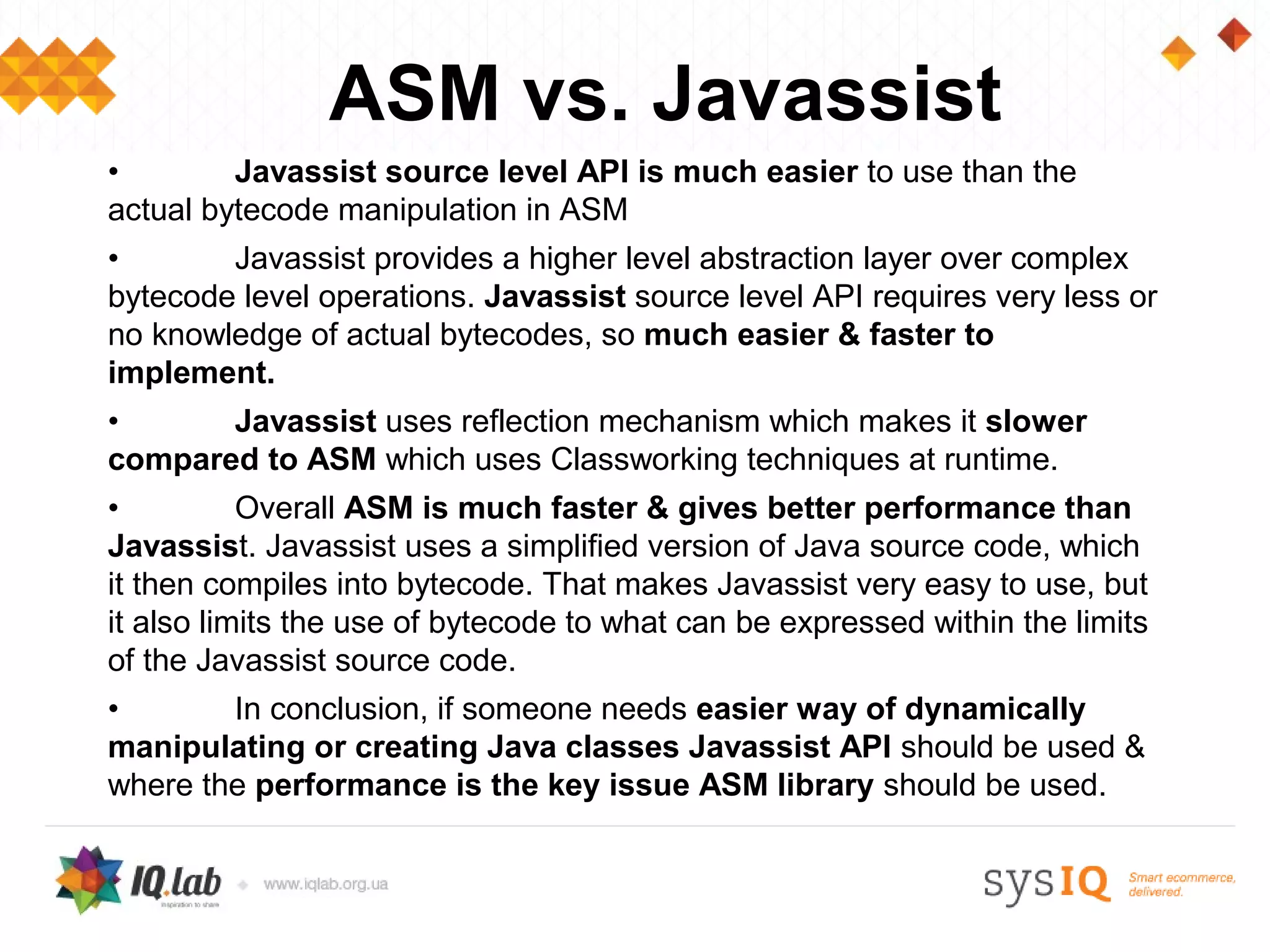
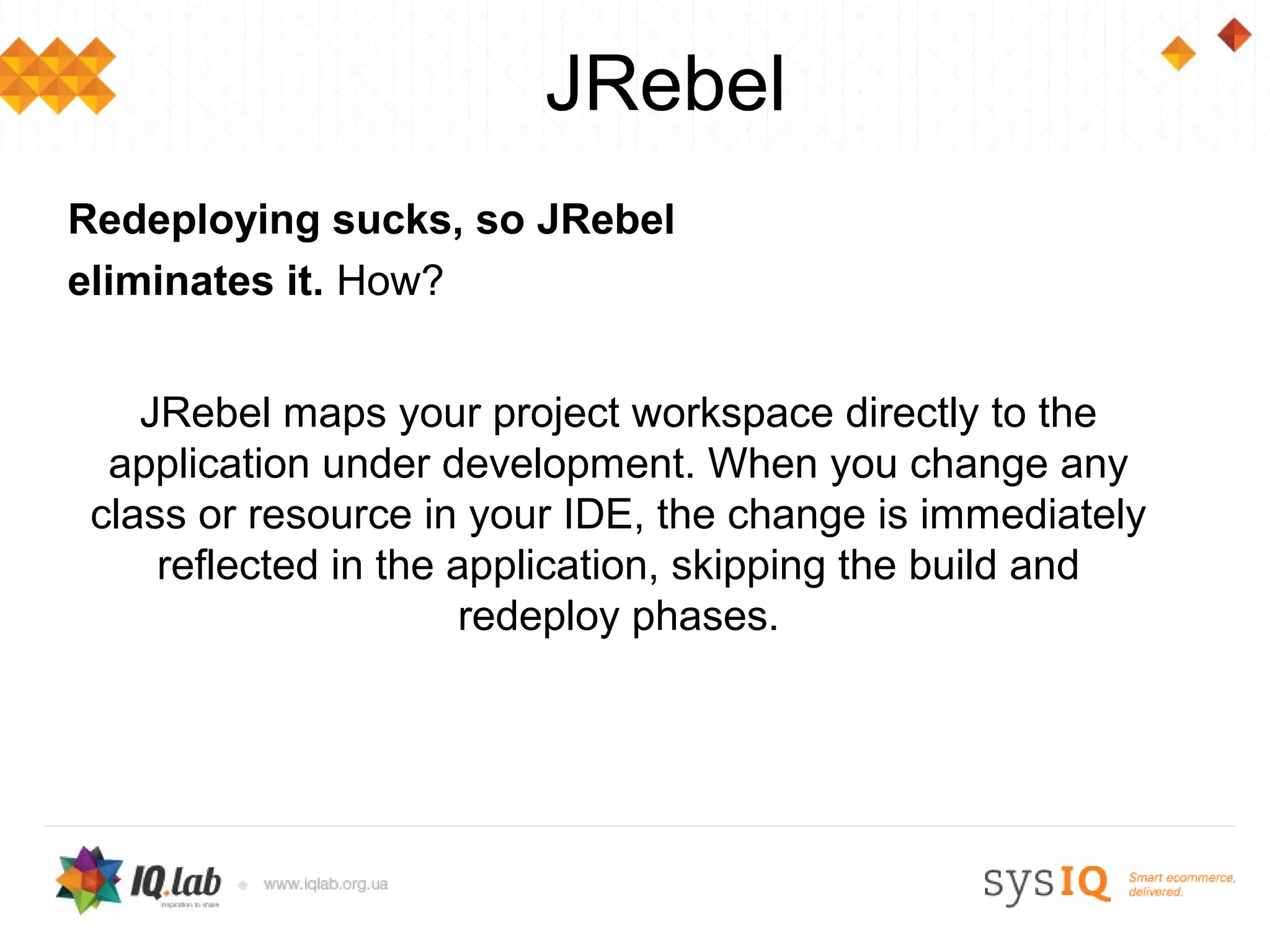
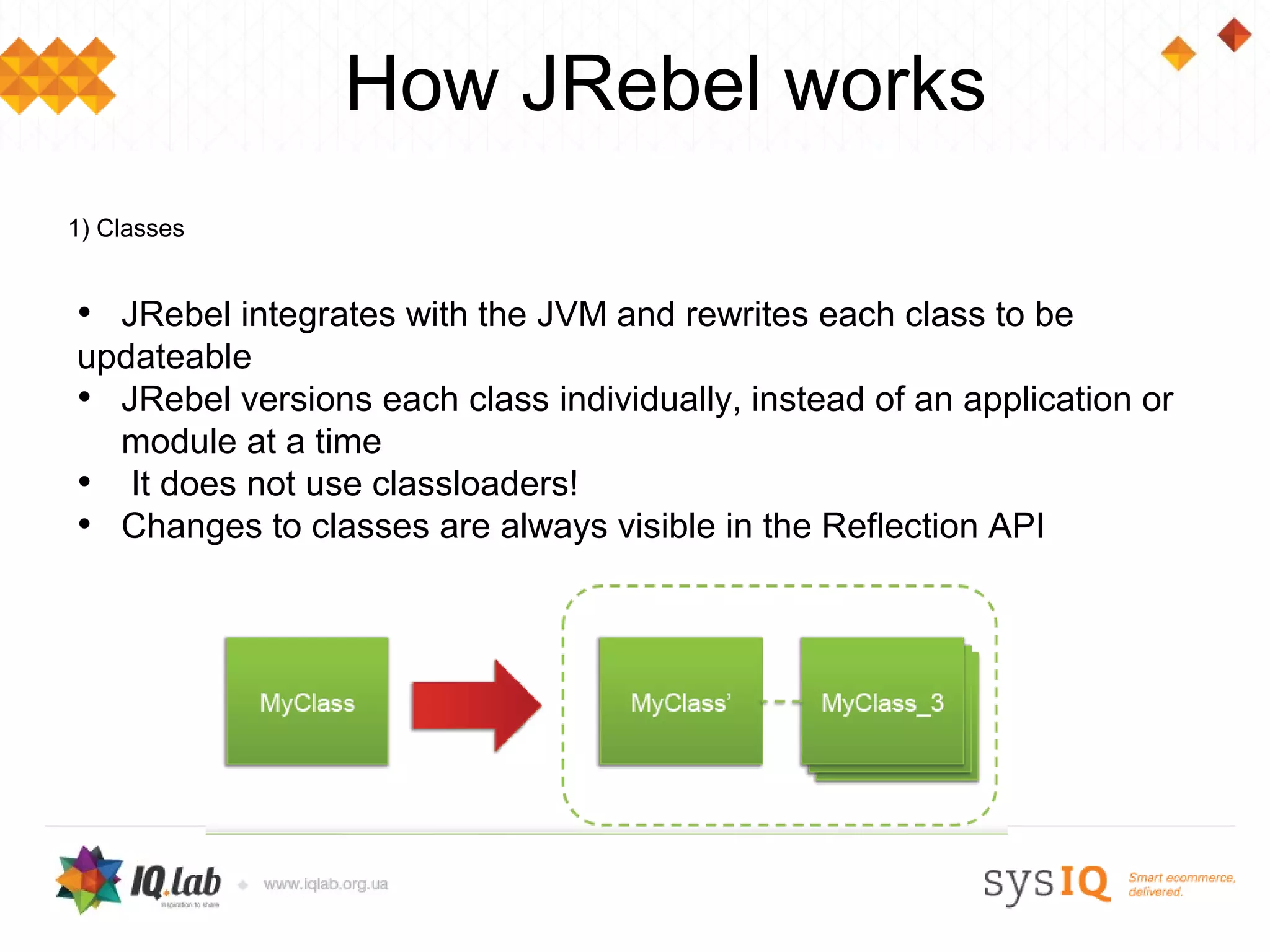
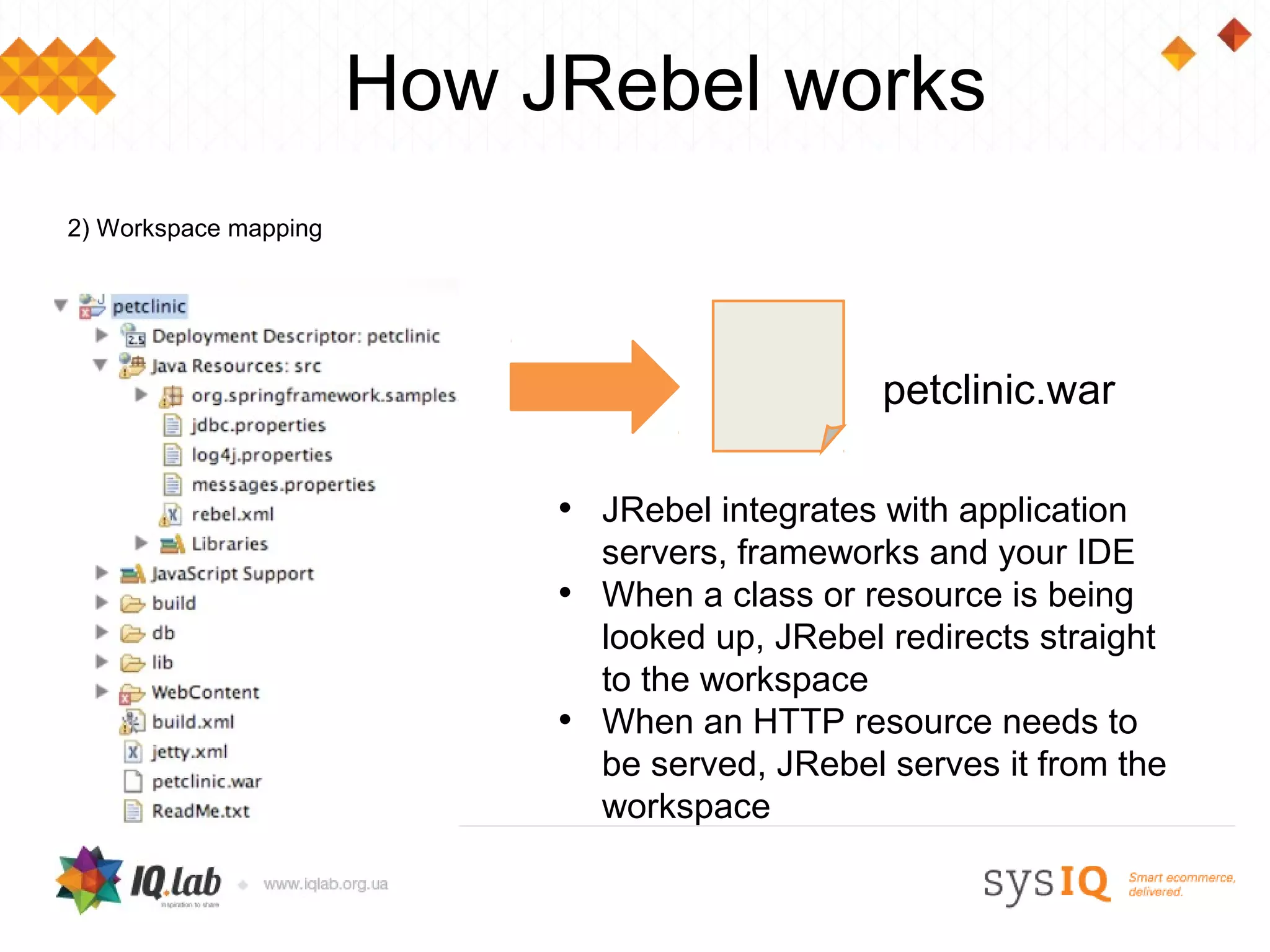
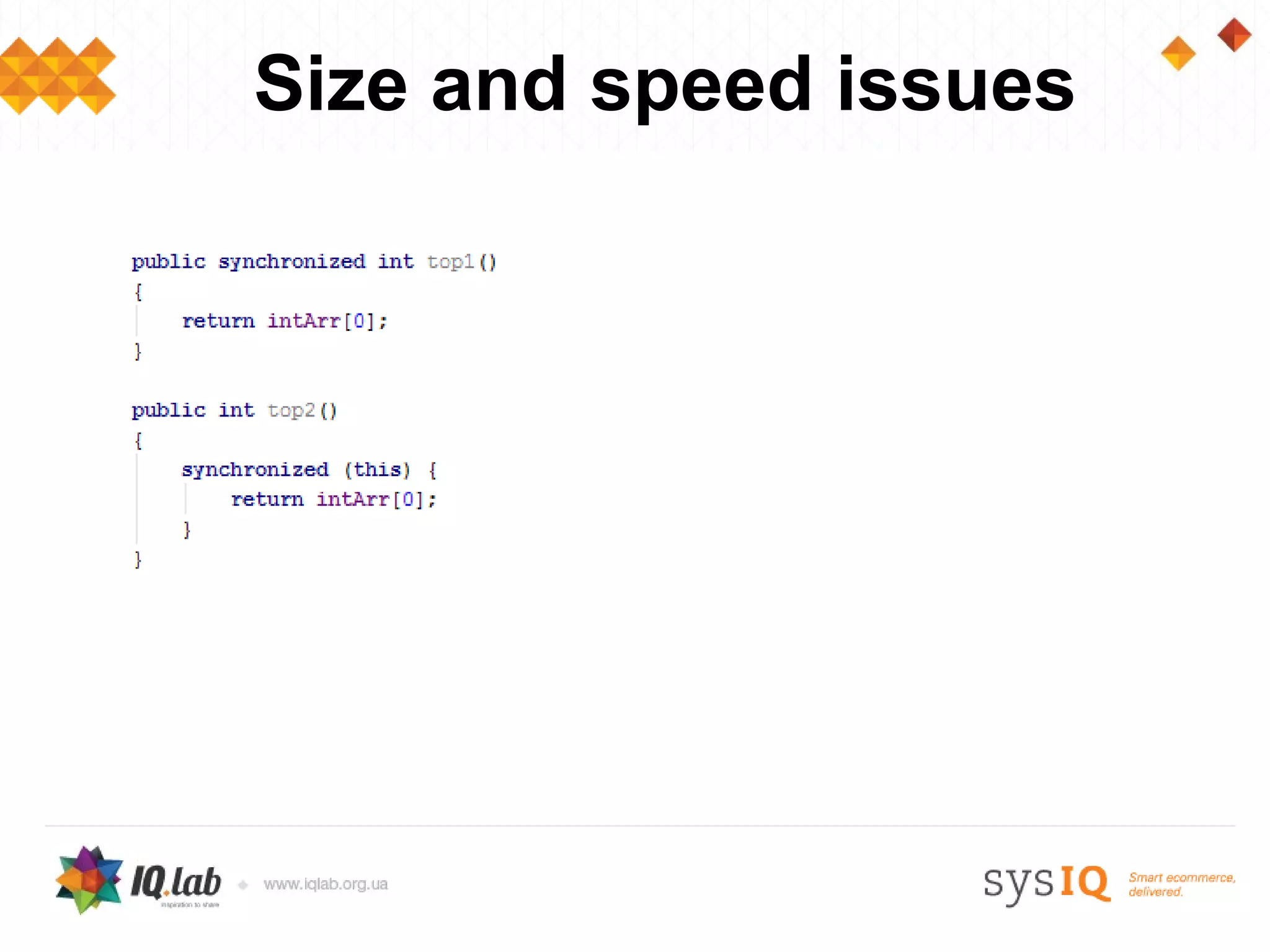
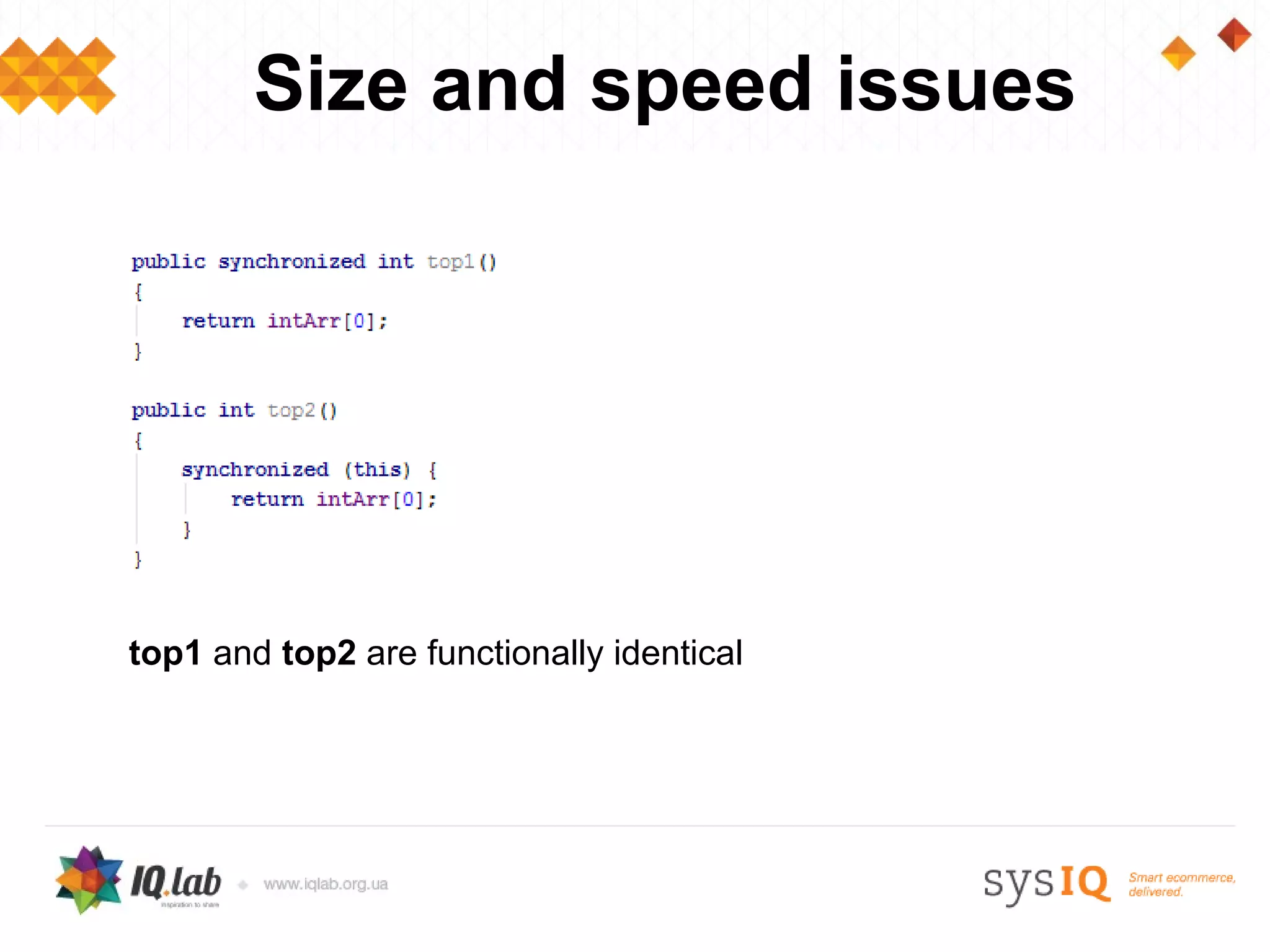
![Size and speed issues
Method int top1()
0 aload_0 //Push the object reference(this) at index
//0 of the local variable table.
1 getfield #6 <Field int intArr[]>
//Pop the object reference(this) and push
//the object reference for intArr accessed
//from the constant pool.
4 iconst_0 //Push 0.
5 iaload //Pop the top two values and push the
//value at index 0 of intArr.
6 ireturn //Pop top value and push it on the operand
//stack of the invoking method. Exit.](https://image.slidesharecdn.com/mastering-byte-code-java-fusion-sysiq-iqlab-120810073323-phpapp02/75/Mastering-Java-ByteCode-40-2048.jpg)
![Size and speed issues
Method int top2()
0 aload_0
1 astore_2
2 aload_2
3 monitorenter
4 aload_0
5 getfield #6 <Field int intArr[]>
8 iconst_0 //Push 0.
9 iaload
10 istore_1
11 jsr 19
14 iload_1 .
15 ireturn
16 aload_2
17 monitorexit . Exception table: //If any exception occurs between
18 athrow . from to target type //location 4 (inclusive) and location
19 astore_3 4 16 16 any //16 (exclusive) jump to location 16
20 aload_2
21 monitorexit
22 ret 3
.](https://image.slidesharecdn.com/mastering-byte-code-java-fusion-sysiq-iqlab-120810073323-phpapp02/75/Mastering-Java-ByteCode-41-2048.jpg)
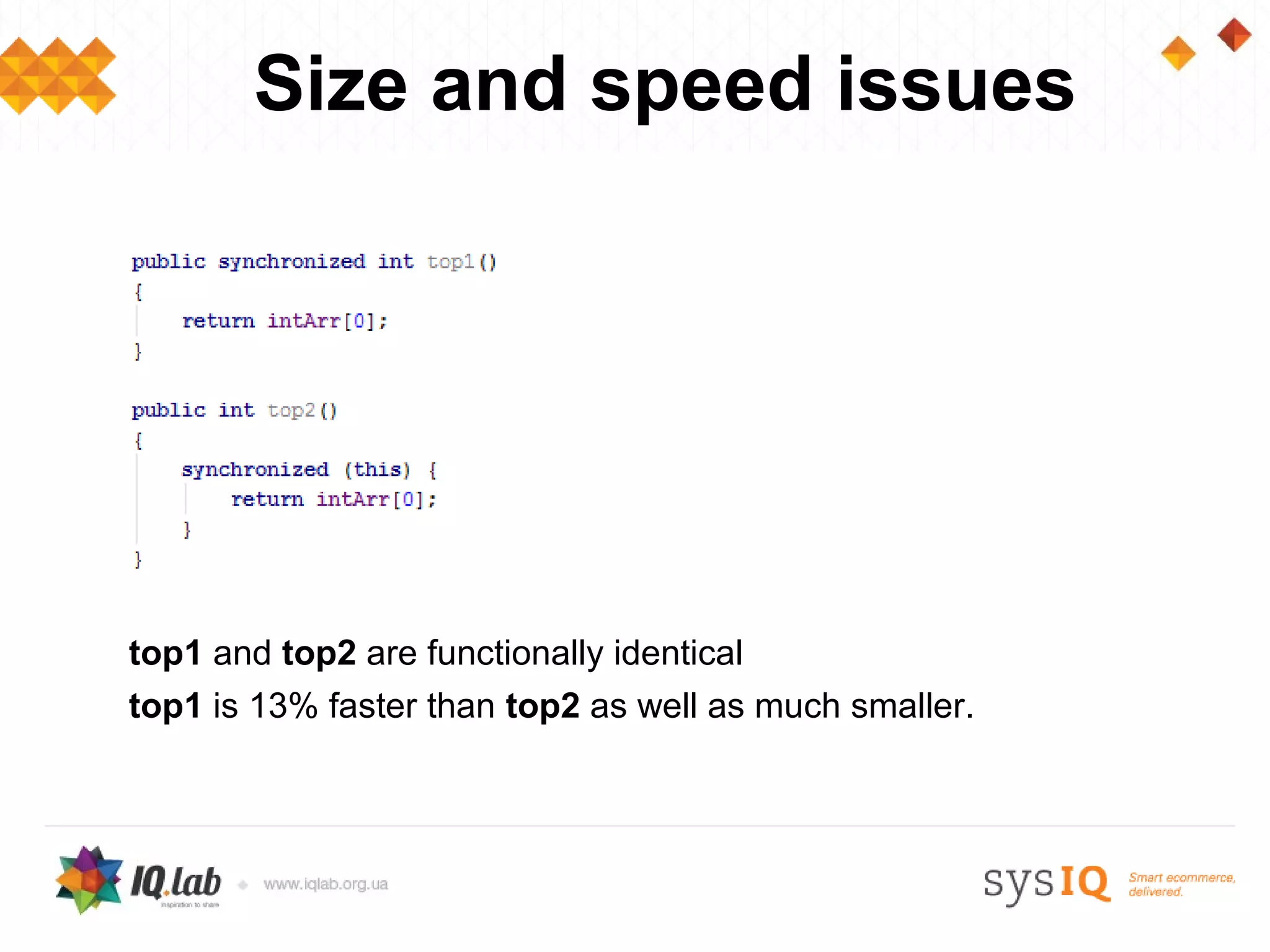
![Puzzle Cutting Class
public class Strange2 {
public class Strange1 {
public static void main(String[] args) {
public static void main(String[] args) {
Missing m; try {
try {
m = new Missing(); } catch
Missing m = new Missing(); } catch
(java.lang.NoClassDefFoundError ex) {
(java.lang.NoClassDefFoundError ex) {
System.out.println("Got it!");
System.out.println("Got it!");
}
}
}
}
}
}
class Missing {
Missing() { }
}](https://image.slidesharecdn.com/mastering-byte-code-java-fusion-sysiq-iqlab-120810073323-phpapp02/75/Mastering-Java-ByteCode-43-2048.jpg)
![Puzzle Cutting Class
public class Strange2 {
public class Strange1 {
public static void main(String[] args) {
public static void main(String[] args) {
Missing m; try {
try {
m = new Missing(); } catch
Missing m = new Missing(); } catch
(java.lang.NoClassDefFoundError ex) {
(java.lang.NoClassDefFoundError ex) {
System.out.println("Got it!");
System.out.println("Got it!");
}
}
}
}
}
}
class Missing {
Missing() { }
}](https://image.slidesharecdn.com/mastering-byte-code-java-fusion-sysiq-iqlab-120810073323-phpapp02/75/Mastering-Java-ByteCode-44-2048.jpg)
![Puzzle Cutting Class
public class Strange2 {
public class Strange1 {
public static void main(String[] args) {
public static void main(String[] args) {
Missing m; try {
try {
m = new Missing(); } catch
Missing m = new Missing(); } catch
(java.lang.NoClassDefFoundError ex) {
(java.lang.NoClassDefFoundError ex) {
System.out.println("Got it!");
System.out.println("Got it!");
}
}
}
}
}
}
class Missing {
Missing() { }
}
???
System.out.println("Got it!"); throws an uncaught
NoClassDefFoundError](https://image.slidesharecdn.com/mastering-byte-code-java-fusion-sysiq-iqlab-120810073323-phpapp02/75/Mastering-Java-ByteCode-45-2048.jpg)
![Puzzle Cutting Class
public class Strange2 {
public class Strange1 {
public static void main(String[] args) {
public static void main(String[] args) {
Missing m; try {
try {
m = new Missing(); } catch
Missing m = new Missing(); } catch
(java.lang.NoClassDefFoundError ex) {
(java.lang.NoClassDefFoundError ex) {
System.out.println("Got it!");
System.out.println("Got it!");
}
}
}
}
class Missing {
Missing() { }
}
System.out.println("Got it!"); Expected throws an uncaught
NoClassDefFoundError
throws an uncaught Result System.out.println("Got it!");
NoClassDefFoundError](https://image.slidesharecdn.com/mastering-byte-code-java-fusion-sysiq-iqlab-120810073323-phpapp02/75/Mastering-Java-ByteCode-46-2048.jpg)
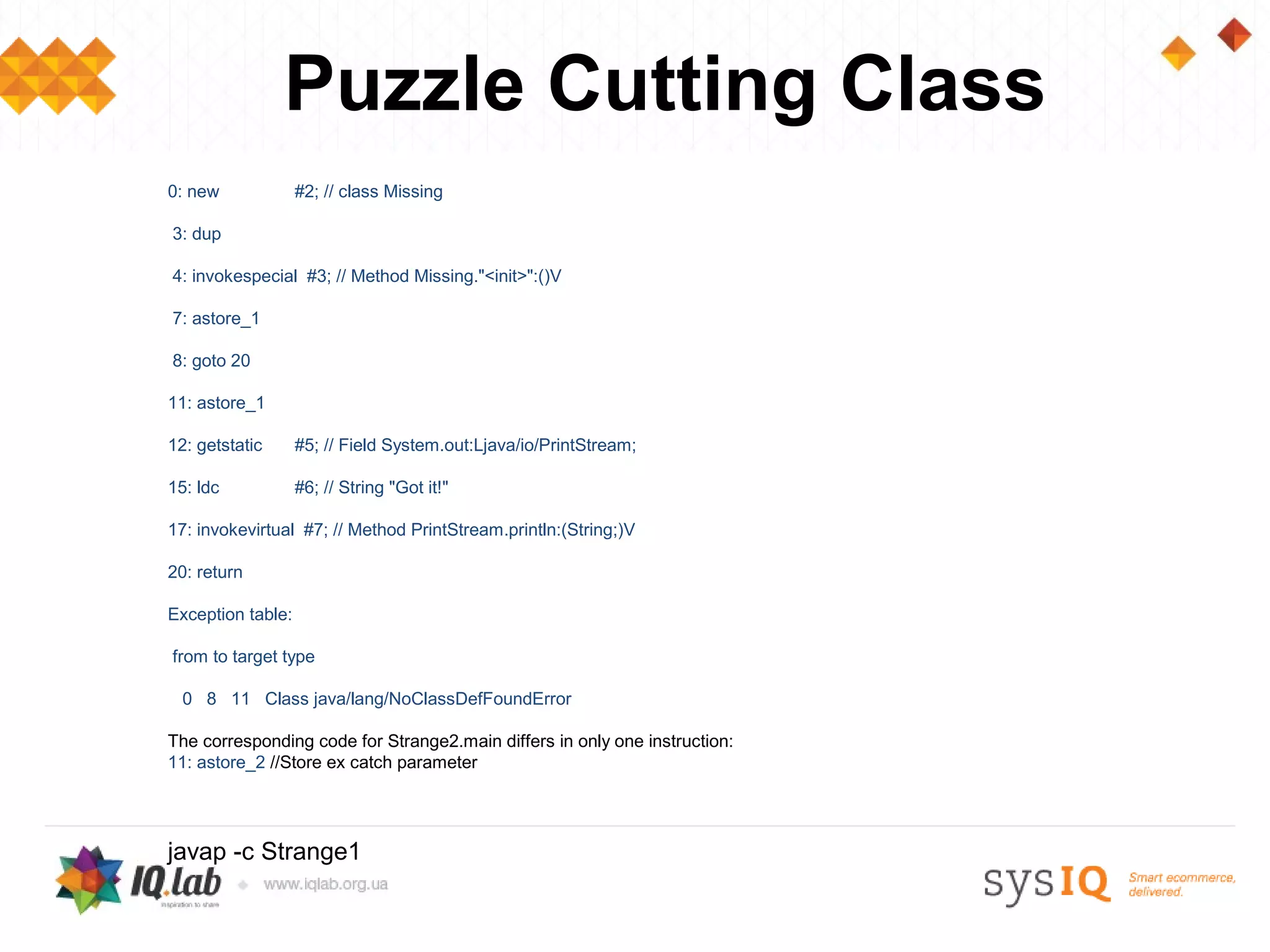
![Using reflection
public class Strange {
public static void main(String[] args) throws Exception {
try {
Object m = Class.forName("Missing").newInstance();
} catch (ClassNotFoundException ex) {
System.err.println("Got it!");
}
}
}](https://image.slidesharecdn.com/mastering-byte-code-java-fusion-sysiq-iqlab-120810073323-phpapp02/75/Mastering-Java-ByteCode-48-2048.jpg)
